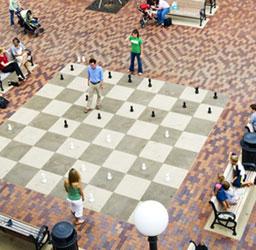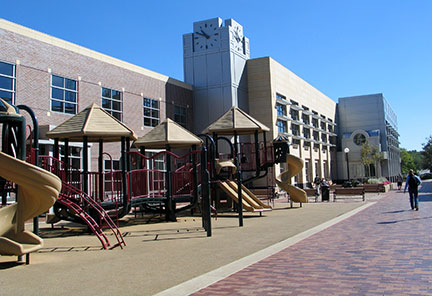Ophthalmology Residency
About Residency
We invite you to consider the advantages of a program that will expose you to:
- high-powered faculty members dedicated to your success
- comprehensive exposure to all subspecialties
- state-of-the-art clinical facilities
The accomplishments of our residency graduates demonstrate our commitment to help you develop necessary medical judgment to succeed in your career endeavors.
The ophthalmology resident training program gives residents a broad comprehensive ophthalmology background and opportunities to gain experience subspecialties as well.
In training residents, the Department strives to produce excellent practitioners. We also want our residents to learn to be good teachers and to acquire a critical and inquiring approach to investigating the unsolved problems of ophthalmology.
Residents rotate through every service, work closely with faculty and fellows, and participate fully in surgery under the expert guidance of faculty. Residents are required to actively participate in clinical or basic research during their training.
Committed to Education
The ophthalmology resident training program lasts three years with five residents appointed annually. Our program is poised to meet the needs of the changing face of today’s health care. We aim to assure that residents receive a broad comprehensive background in ophthalmology and develop research skills to make them better clinicians. We want to assure our graduates are completely ready for whatever they may encounter in private practice or in further training in a subspecialty. We are committed to providing all our trainees with an appropriate and varied surgical experience to achieve competence as ophthalmic surgeons. With this commitment, we feel we have a moral obligation to our patients and the public to foster the highest moral and ethical behavior.
Approximately half of our graduates enter private practice immediately upon completion of the 3-year residency. Others pursue fellowship training before going into practice or entering an academic career. Regardless of a resident or fellow's choice of career path, he or she should feel fully confident of having received the best possible training in ophthalmology. As part of the Iowa Ophthalmology Family, they have worked with dedicated and experienced faculty in a contemporary and world-renowned program. We believe at the completion of training, graduates of the University of Iowa Department of Ophthalmology and Visual Sciences are prepared for the challenges ahead and can look forward to the fulfillment that comes from pursuing a career that fosters life-long education.
Joint Internship
Our joint internship (PGY-1 year) is based on a strong relationship between the internal medicine and ophthalmology departments. The joint internship is required for our interns.
This internship will include four-week rotations on the medicine service and three four-week rotations on ophthalmology. The interview for the internship will occur along with our ophthalmology residency interview.
As an intern on the ophthalmology service, you will learn basic examination skills and be ready to take care of most simple problems and triage complex eye problems. While on the ophthalmology service, you will have no call, thus allowing you to focus on study.
The intern year will be divided into thirteen 4-week rotations:
- Two 4-week ophthalmology rotations at the Iowa City VA Medical Center, caring for patients in clinic.
- One 4-week rotations on the University of Iowa Hospitals & Clinics comprehensive ophthalmology service, caring for patients in clinic, the emergency department, and the inpatient units.
- Two 4-week rotations focusing on medical imaging and emergency medicine.
- Eight 4-week rotations on the medicine service, covering the wards at University of Iowa Hospitals & Clinics and Veterans Affairs. Two of the eight rotations will be outpatient ambulatory medicine rotations, 1 block of rheumatology and 1 block of either general ambulatory medicine or endocrinology, during these blocks there is no call, allowing further time for study. The objective during these rotations will be to hone your basic medical skills, including the management of inpatients.
- Three weeks of vacation over the year, two during medicine blocks and one during ophthalmology blocks
We believe there are many distinct advantages to our joint internship program:
- Providing ophthalmology experience before taking any call, will make the transition to clinic and call responsibilities smoother and more effective.
- Becoming an integrated member of our ophthalmology team early in your training.
- Avoiding multiple interviews for other intern year positions, saving time, money and stress.
- Monthly lunch lectures directed towards interns on basic, commonly encountered diagnoses in ophthalmology.
- Moving only once during residency.
- Gaining familiarity with the hospital, electronic medical record, and members of other services with whom you will be working throughout the remainder of your residency.
- Having access to our structured wet lab and EyeSi surgical simulator.
- Acquiring exposure to a broad range of available research projects that can be carried forward through your ophthalmology residency.
We are excited to offer this joint opportunity that we believe makes our program the best in the country. In the additional time in ophthalmology training, our residents will learn systems-based skills, have ample time for independent study, and learn basic ophthalmology exam and assessment skills which will put them far ahead by the time they begin their PGY-2 year.
Questions?
For questions regarding our new combined internship feel free to contact our program staff or any of our current joint IM/Ophthalmology interns:
- Pavlina Kemp, Program Director (pavlina-kemp@uiowa.edu)
- Thomas Oetting, Associate Program Director (thomas-oetting@uiowa.edu)
- Laura Pitlick, Program Coordinator (laura-pitlick@uiowa.edu)
First Year Residency
The first year is spent in a combination of comprehensive ophthalmology service and subspecialty clinics. The year is arranged to allow the resident to acquire skills in complete ocular examination and refraction of ophthalmic patients at the UIHC Comprehensive Ophthalmology Clinic and during a 10 to 12 week rotation at the VA.
In this year, Residents also rotate through subspecialty clinics with the intent of learning some of the vocabulary, examining techniques, and equipment used in each area. There are 5 rotation blocks per year, however, some of these rotations are split between two or more services. This in the first year, the resident will spend time in the following services (See Ophthalmology Rotations page for details):
- Comprehensive Ophthalmology Clinic
- Cornea/External Disease
- Glaucoma
- Neuro-Ophthalmology
- Oculoplastics
- Ocular Pathology
- Pediatric Ophthalmology & Adult Strabismus
- Retina
- VAMC-Iowa City
Also see about our Research Requirement in Research Training to follow.
Second Year Residency
During the second year, residents begin their surgical rotations. They have five rotations spending ten to 12 weeks in pediatric ophthalmology/strabismus, glaucoma, neuro-ophthalmology, retina, and at the Veterans Affairs Medical Center in Iowa City. While on the neuro-ophthalmology rotation, residents spend one day a week on cataract surgery. They spend less time on call during this phase of the residency program and often work on their required research project and case presentations for eyerounds.org.
- Pediatric Ophthalmology and Adult Strabismus Service
- Glaucoma Service
- Neuro-Ophthalmology Service
- Vitreoretinal Service
- VAMC-Iowa City
Third Year Residency
The third year the resident has increased clinical responsibility. This year is mostly spent with leadership and surgical experiences in the Iowa City and Des Moines VAMCs and University Comprehensive Service. Residents also train in Oculoplastics, office management, and Cornea.
Residents have a ten-week rotation in the Des Moines VAMC that includes a clinic at the affiliated Broadlawns Hospital two afternoons a week.
A rotation in office management allows the resident to begin learning the ever-changing domain of billing, coding, and compliance with federal and state regulations. This rotation takes place in our departmental Billing Office to allow residents to learn the basic coding and billing principles needed for practice in today’s health care environment. This is a split rotation, with oculoplastic surgery covered every other Friday.
- Oculoplastics/Orbital Oncology Service
- Cornea / External Diseases and Refractive Surgery
- Comprehensive Ophthalmology and Cataract Surgery
- Veterans Affairs Medical Centers
- VAMC Des Moines
- VAMC Iowa City
- International Ophthalmology Experience Option
Also see about our Research Requirement in Research Training to follow.
Ophthalmology Residency Rotations and Services
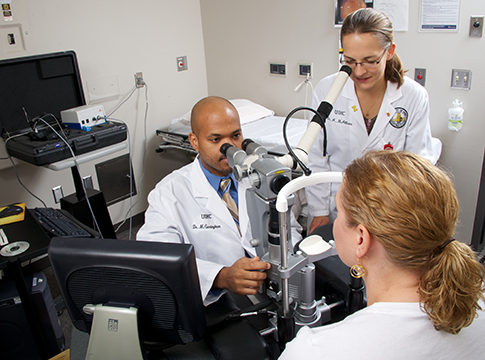 Rotations in Ophthalmology are ten to 12 weeks in length. Most are located at University of Iowa Hospitals & Clinics.
Rotations in Ophthalmology are ten to 12 weeks in length. Most are located at University of Iowa Hospitals & Clinics.
- 1st year: 4 rotations at UIHC, 1 rotation at VA Iowa City
- 2nd year: 4 rotations at UIHC, 1 rotation at VA Iowa City
- 3rd year: 3 rotations at UIHC, 1 rotation at VA Iowa City, 1 rotation in Des Moines (VA and Broadlawns)
THE COMPREHENSIVE OPHTHALMOLOGY CLINIC AND CATARACT SERVICE
The Comprehensive Ophthalmology Service examines all patients desiring a general eye examination, cataract surgery, as well as those referred to the hospital because of vision problems. The university student population of over 30,000 provides a major source for routine refractions. The Comprehensive Ophthalmology Clinic provides general ophthalmic care for more than 16,000 patient visits annually. Patients are screened for specific ocular problems and, if necessary, referred to appropriate specialty services. In addition, the Comprehensive Ophthalmology Clinic provides a daytime on-call service for emergent eye problems, diagnosis, care, and consultations.
Each resident is expected to do a complete ophthalmic examination on each patient. This includes a manifest or cycloplegic refraction by retinoscopy, slit lamp biomicroscopy, gonioscopy when indicated, and direct and indirect ophthalmoscopy of the retina. Residents are expected to become thoroughly familiar with all techniques and methods of the ocular examination.
CATARACT SERVICE: One day a week during the 10-12 week Neuro-ophthalmology rotation in the second year will be spent in the Cataract Service. The resident on this service develops increasing responsibility for the care of patients before, during and after cataract surgery. They use deliberate practice of the capsulorhexis and post-surgical video formative feedback to hone their surgical skills. Residents on this service will hone their professional communication skills by helping with the preoperative, operative, and post-operative documentation on this busy service
During the third year, the resident will rotate through the comprehensive service for a ten to 12 week continuous period. During this time, the resident develops comprehensive ophthalmologic care, evaluates and manages ophthalmic emergencies, and performs high-quality, efficient, anterior segment surgery.
CORNEAL/EXTERNAL DISEASE AND REFRACTIVE SURGERY SERVICE
On the Corneal/External Disease and Refractive Surgery Service, residents receive extensive training in the medical and surgical management of corneal diseases, including eye banking and refractive surgery. Each resident will rotate through this service twice during their training. The first-year resident, under the direction of the faculty, fellows, and more senior residents, are introduced to cornea and external disease examination techniques and treatment strategies, they also spend two days each week during the last five weeks of this rotation in contact lens.The third-year resident has greater responsibility in the management of patients with cornea and external diseases. In the third year, refractive surgery is done under faculty supervision. There is a one-year fellow working with residents.
CONTACT LENS SERVICE
A full-time optometrist supervises the Contact Lens Service. Under the supervision of the optometrist and optician, residents will enhance their knowledge of optics and develop an understanding of basic contact lens design and materials. During this time reisdents will experience fitting uncomplicated and cosmetic-type contact lenses, as well as post cataract surgical patients, infants as young as 2 weeks old, and others.
In the third year, the resident spends one day per week for 5 weeks in the Contact Lens Service under the guidance of a full-time optometrist. During this time, the resident continues study in the specialty of contact lens fitting and problem solving, evaluation, and dispensing of contact lenses.
GLAUCOMA SERVICE
The Glaucoma Service provides experience with medical and surgical decision-making in the management of these patients.
The first-year resident spends time in this clinic three to five days a week for ten weeks. This initial exposure serves as the introduction to the clinical evaluation of glaucoma patients. The resident learns and performs diagnostic skills including visual fields and OCT needed for the evaluation of anterior segment disease as it pertains to glaucoma.
The second-year resident spends ten weeks managing challenging glaucoma patients. The resident does complete evaluations of new glaucoma patients and provides continuing care to patients returning for follow-up care. The resident gains experience at gonioscopy, optic nerve head examination, kinetic perimetry, and static threshold perimetry. Laser therapy for glaucoma, including Argon laser trabeculoplasty and laser peripheral iridotomy, is performed by the resident under staff supervision. Glaucoma filtering surgery and cataract surgery on patients with glaucoma are performed during this rotation. There is a one-year fellow on the Glaucoma Service.
NEURO-OPHTHALMOLOGY SERVICE
The Neuro-ophthalmology Service is both an outpatient clinic and an inpatient consultation service. Many patients have complex problems that require extensive evaluation. Each patient is seen by a resident or fellow and staffed by faculty. Patients requiring an in-hospital work-up are admitted to Neurology but are followed by the Neuro-ophthalmology Service. Consultations for temporal artery biopsies are handled by this service. All patients are presented to staff at the time they are seen and are then discussed during daily working rounds. Residents from Neurology and Neuro-surgery may take elective rotations in the Neuro-ophthalmology Clinic. There are usually one or two fellows in the Neuro-Ophthalmology Service.
First-year residents spend one day per week for 10 weeks on this rotation. In the second year, the rotation occupies 10-12 weeks. The second-year resident on the Neuro-op Service is also responsible for moderating morning rounds.
Residents on the Neuro-ophthalmology Service are also responsible for moderating morning rounds.
OCULOPLASTICS/ORBITAL ONCOLOGY SERVICE
The Oculoplastics Service is involved with the evaluation and management of patients with diseases of their eyelid and adnexa, lacrimal system, and orbit.
The first-year resident spends one day per week on this service for five weeks during this rotation. (The rotation is split in the first year between Cornea, Oculoplastics, Pediatrics, and Contact Lens). The resident is instructed on the techniques in the evaluation of these patients, including exposure to the interpretation of radiologic studies of the orbit. The resident is also expected to be present in the operating room for the first case on every Wednesday morning while on this rotation.
A third-year resident spends ten to 12 weeks on this service. The clinic is conducted two days per week, with the residents and fellow seeing all patients prior to examination by the staff. The third-year resident performs or assists in surgery two days per week under the direction of staff or a fellow. Faculty provide guidance in ophthalmic plastic and orbital examination techniques, diagnosis and treatment of oculoplastic/orbital disorders, pre-operative and post-operative evaluation, management of surgical patients, and surgical management of oculoplastic/orbital problems. The oculoplastics fellow spends 24 months in training. The fellowship is approved by the American Society of Ophthalmic Plastic and Reconstructive Surgery.
OPHTHALMIC PATHOLOGY / CONSULTATION SERVICE
While on this rotation, residents perform gross examinations on tissues passing through the laboratory including whole eyes, corneal buttons, and all varieties of biopsy material. This gross examination is entirely supervised by faculty from the Division of Eye Pathology. Each resident is responsible for studying the microscopic appearances of tissues and for discussing these cases. There will be no unsupervised handling of tissues.
In the first year of residency, the afternoons of the Glaucoma-Consults/Pathology rotation are spent in the ocular pathology laboratory. Each resident is responsible for studying the microscopic appearances of tissues and for discussing these cases. Each rotation includes at least two presentations in Morning Rounds of a histopathologic clinical correlation. Residents are responsible for inpatient consultations during the work week.
PEDIATRIC OPHTHALMOLOGY AND ADULT STRABISMUS SERVICE
All pediatric eye problems other than routine refractions are directed to Pediatric Ophthalmology and Adult Strabismus. Faculty, fellows, residents, and orthoptists examine and evaluate children and adults with motility problems. Two certified orthoptists and student orthoptists participate in the clinic. There are usually one or two postgraduate fellows on the service as well.
First-year residents spend Monday, Tuesday, and Tuesday of a second 5 week block in this clinic, Most of the first-year rotation time is spent with the orthoptists learning the basic pediatric eye exam.
An additional ten weeks on this service occurs full time in the second year. The second-year residents on the Pediatric Ophthalmology and Adult Strabismus Service work up all patients referred to the service. Surgical cases are supervised and handled by the senior attending staff, fellows, and the residents on the service.
In advance of the rotation on the Pediatric Ophthalmology Service, a study outline with pertinent references is given to each resident. At various times, topics are discussed. Reading of the prescribed outline is essential in understanding these discussions.
MEDICAL RETINA
The Medical Retina rotation introduces first-year residents to medical retinal diseases. The first-year resident is not expected to be in the operating room. Emphasis is placed on vascular disorders of the eye, diabetic retinopathy, macular disease, and retinal detachment. The resident also receives instruction on fluorescein angiography, indirect and direct ophthalmoscopy, slit lamp biomicroscopy, and diagnostic contact lens examination, and other techniques for the diagnosis of diseases of the retina and vitreous.
VISION REHABILITATION
The medical retina rotation also involves the evaluation of patients with low vision. In the Vision Rehabilitation Service, the first-tear resident is exposed to the various vision rehabilitation aids. The work-up and rehabilitation of low vision patients is done with faculty supervision. The resident will first observe a vision rehabilitation practitioner providing vision rehabilitation services. As the rotation progresses, the resident will perform the basis elements of the vision rehabilitation evaluation. Following this rotation the resident will be able to evaluate the needs of individuals who are visually impaired.
VITREORETINAL SERVICE
The Vitreoretinal Service provides an opportunity for residents to gain a broad experience in disease and surgery of the retina and vitreous. The resident will be trained in the use of laser photocoagulation to treat retinal breaks and diabetic retinopathy. Residents will receive an introduction into the theory and practical application of scatter laser treatment for diabetic proliferative disease.
During the second year of residency, the resident becomes skilled in the use of indirect ophthalmoscopy, scleral indentation, contact lens examination of the fundus, and fluorescein angiography. They perform laser treatment on diabetic patients under faculty or fellow supervision. The quality of the resident's work-up, skill in indirect ophthalmoscopy and Goldmann lens examination, and surgical dexterity are important factors in ascertaining the resident's qualifications for this type of surgery. Faculty and fellows actively participate in resident training. Four fellows spend 24 months studying vitreoretinal diseases and surgery and ocular oncology. The vitreoretinal fellowship is staggered so that two new fellows begin each July.
VETERANS ADMINISTRATION HOSPITALS
Residents rotate through the Iowa City VA Medical Center in each of the three years of residency.
During their first-year rotation, residents share primary patient responsibility in the VA clinic with a second-and third-year resident. The first-year resident begins to work in the OR starting in the simulator and wet lab. Faculty supervise the clinic and assist the second-year residents in cataract surgery. All pre-operative patients will be examined and approved by a staff member. Subspecialty surgery is supervised by members of the appropriate service. Faculty supervise the clinic and assist residents in surgery.
The Veterans Administration Medical Centers in Iowa City and Des Moines allows the third-year resident to supervise and run a busy outpatient clinic, with faculty supervision available promptly on request. Third-year residents spend ten to 12 weeks at the Des Moines VAMC, which includes a clinic at the affiliated Broadlawns Hospital.
- VAMC Des Moines
- VAMC Iowa City
UVEITIS
This intensive experience in a busy Uveitis Clinic takes place on 10 half-days during a 10 week rotation during the first year. The resident develops the history-taking and examination skills to care for complex uveitis patients. The resident learns to navigate the system of care to allow for consultation with various services and laboratory assessment to properly care for uveitis patients.
Rounds, Lectures, and Conferences
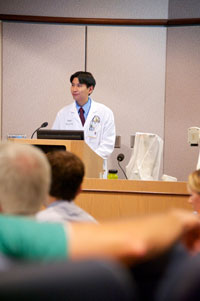 Grand rounds are held Monday through Thursday from 8:00 to 8:45 a.m. in the Braley Auditorium. All residents and staff attend unless operating or engaged in acute medical care. During rounds, residents and fellows develop their public speaking skills by making presentations. Discussion by the faculty and house staff follows each case.
Grand rounds are held Monday through Thursday from 8:00 to 8:45 a.m. in the Braley Auditorium. All residents and staff attend unless operating or engaged in acute medical care. During rounds, residents and fellows develop their public speaking skills by making presentations. Discussion by the faculty and house staff follows each case.
The cases and discussions presented by Residents and Fellows at Grand Rounds are often further developed and published as case reports and tutorials on EyeRounds.org.
Afternoons are, in general, reserved for rotation-specific conferences. Some services such as glaucoma, cornea, neuro-ophthalmology, and pediatric ophthalmology have "chart rounds". These conferences focus on interesting patients that presented that day. Discussions center on patient care but also cover other areas such as communication, ethics, and systems based care. Other services such as retina have formal conferences, such as Fluorescein conference on Monday afternoons, and Dr. Ed Stone's molecular ophthalmology rounds on Tuesday nights.
Once a week during the academic year, didactic lectures on ophthalmology are presented. These two-hour lectures are organized to coincide with the American Academy of Ophthalmology’s Basic and Clinical Sciences Course. Lectures cover most aspects of basic and clinical ophthalmology. Once every 10 weeks these sessions include a journal club covering recent journal articles in that subject area to help develop skills in practice based learning.
Six, day-long clinical conferences are held during the academic year. Clinics are closed on these days. Ophthalmologists from throughout Iowa and Illinois attend and present challenging clinical problems for discussion by faculty and guests. These meetings feature a visiting professor who presents a lecture based on his/ her research interests. The day is balanced by the presentation of a more clinically oriented topic. This conference has contributed to the excellent rapport between practicing ophthalmologists and the ophthalmology staff at the university.
Each year in June, alumni and other members attend a two- to three-day Iowa Eye Association meeting with invited speakers and a focus on a specific subspecialty topic.
Presentations of research are made annually during the Resident/Fellow Research Conference at the end of the academic year.
Ophthalmology Training Program Duty Hours
Duty hours are defined as all clinical and academic activities related to the program, i.e., patient care (both inpatient and outpatient), administrative duties related to patient care, the provision for transfer of patient care, time spent in-house during call activities, and scheduled academic activities such as conferences. Duty hours do not include reading and preparation time spent away from the duty site.
Duty hours must be limited to 80 hours per week, averaged over a four-week period, inclusive of all in-house call activities.
Residents must be provided with one day in 7 free from all educational and clinical responsibilities, averaged over a 4-week period, inclusive of call. One day is defined as one continuous 24-hour period free from all clinical, educational, and administrative activities.
Adequate time for rest and personal activities must be provided. This should consist of a 10-hour time period provided between all daily duty periods.
At-home call (pager call) is defined as call taken from outside the assigned institution.
- The frequency of at-home call is not subject to the every-third-night limitation. However, at-home call must not be so frequent as to preclude rest and reasonable personal time for each resident. Residents taking at-home call must be provided with one day in 7 completely free from all educational and clinical responsibilities, averaged over a 4-week period.
- When residents are called into the hospital from home, the hours residents spend in-house are counted toward the 80-hour limit.
The program director and the faculty must monitor the demands of at-home call in their programs and make scheduling adjustments as necessary to mitigate excessive service demands and/or fatigue. Residents should report time spent at hospital after 2:00 AM to the Program Director or Program Coordinator the next morning and will most likely be released at noon to avoid fatigue related errors.
Weekend Call Duties
The weekend on-call residents have the same responsibilities as weekday call. Additionally, any patient scheduled for admission or work-up on the weekend is the resident's responsibility. If an operative permit is required, it will be explained to the patient by the surgical team who will come in to the hospital to examine the patient and answer the patient's questions. Any questions about weekend patients should be directed to the senior resident on call or the appropriate service.
The second call physician (a senior resident) will be available to the first call resident for consultation. In addition, he or she will decide, after clearing it with the senior staff member on call, when and if emergency operations should be done. No surgery is to be performed without approval of the senior faculty. Intraocular trauma or orbit cases may only be performed in the presence of a senior faculty member. The senior resident must be available by telephone at all times. The senior resident is required to come in to see any patient on whom the "First Call" resident requests consultation.
Finally, there are four "Senior Staff Call" lists. 1) The senior staff member on general call will be consulted by the third-year resident and will be contacted before any patient is admitted to the hospital or before an operation is planned. 2) The senior staff retina call list is made up of members of the Vitreoretinal Service, who will assist in handling posterior segment trauma and retinal detachments. 3) The Oculoplastic Service covers the plastic call and assists in any problems involving trauma to the lids, adnexae, and orbit. 4) The Neuro-ophthalmology on call staff. The senior staff members also have pagers.
No operation may be performed without the consent and assistance of the senior staff member.
Ophthalmology Resident Call Schedule
At UIHC
- First year residents: First call (none for the first 2 months) then every 5th weekend day and about every 10th weekday night
- Second year residents: First call every 5th weekend/weekday for first 3 then about every 10th weekday night
- Third year residents: Call backup about every 5th weekday and every 5th weekend
At the VA
- Des Moines VA: The Third Year Resident on the Des Moines rotation takes call during the week from Monday to Thursday evening from home. (Rarely come in)
- Iowa City VA: First and Second Year Residents take alternate weeks of call while on the Iowa City VA rotation. (Rarely come in)
Research Training
Research Training
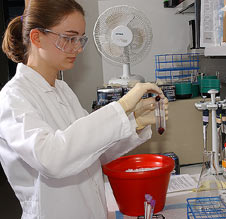 Each ophthalmology resident and fellow is expected to complete a research project based on clinical or laboratory experience. Research is usually performed within the department, but can take place in another department or, occasionally, at another institution. The research interests of the faculty are varied, and many projects are in progress. Presentations of research are made annually during the Resident/Fellow Research Conference at the end of the academic year. The P.J. Leinfelder Award is given annually by a faculty committee to the fellow who has made the most significant contributions in preparing and delivering their research.
Each ophthalmology resident and fellow is expected to complete a research project based on clinical or laboratory experience. Research is usually performed within the department, but can take place in another department or, occasionally, at another institution. The research interests of the faculty are varied, and many projects are in progress. Presentations of research are made annually during the Resident/Fellow Research Conference at the end of the academic year. The P.J. Leinfelder Award is given annually by a faculty committee to the fellow who has made the most significant contributions in preparing and delivering their research.
Research in Ophthalmology and Visual Sciences
The Carver College of Medicine is internationally recognized for its excellence and leadership in biomedical research. Among public medical schools, the College of Medicine ranks 11th in NIH funding in both the number of grants and total grant dollars per research faculty in public medical schools. In 2013, Stephen A. Wynn made a $25 million gift to the University of Iowa and the Institute for Vision Research continues to garner philanthropic funding for its ground-breaking research.
Carver College of Medicine faculty have been awarded approximately half of the University's total research funding and more than 80 percent of its National Institutes of Health funding. The University of Iowa is at the forefront among research universities in this country, and its contribution has been nationally recognized by such eminent authorities as the Carnegie Foundation, which classified The University of Iowa as having "very high research activity" among research universities.
The Laboratory for Disease Gene Discovery (LDGD), directed by Val C. Sheffield, MD, PhD, has as its primary goal the identification and characterization of genes involved in hereditary human disease with special emphasis placed on the study of hereditary retinopathies including age-related macular degeneration. The main strategies used by the laboratory are the use of genetic mapping methods and genomic resources to identify disease genes based on their position within the genome and/or putative function. The LDGD has developed thousands of highly polymorphic human genetic markers and novel genetic mapping methods to aid in the efficient mapping of disease loci. In collaboration with the MOL, the LDGD has succeeded in the mapping of over thirty human disease loci, and the identification of ten disease-causing genes including genes involved in glaucoma, macular degeneration and syndromic retinopathies (Bardet-Biedl Syndrome).
The Iowa Glaucoma Center, directed by Dr. Wallace L.M. Alward, researches the causes of glaucoma and develops tools to aid in diagnosis and treatment.
The Glaucoma Genetics Laboratory, directed by John Fingert, MD, PhD, is dedicated to identifying these genes and investigating their role in the development of disease with the ultimate goal of preventing vision loss by improving diagnosis and treatment of glaucoma.
The Glaucoma Cell Biology Laboratory, directed by Markus Kuehn, PhD, is located in the Medical Education and Research Facility. The goal of this laboratory is to determine the molecular events that lead to retinal ganglion cell death in a variety of retinal diseases. While the research focus is glaucoma, the lab is also investigating ganglion cell death in retinal ischemia and other optic neuropathies, such as idiopathic intracranial hypertension.
The Chorioretinal Degenerations Laboratory is directed by Rob Mullins, PhD. The major focus of this laboratory is to understand the cellular and molecular basis of macular diseases, including age-related macular degeneration (AMD), central serous retinopathy and Best vitelliform macular degeneration.
The laboratory is exploring the role of the choroid in the development of AMD and other diseases. It is also looking at the pathogenesis of other macular diseases including Best disease, Bardet-Biedl syndrome, Leber congenital amaurosis, retinitis pigmentosa, uveitis, and other acquired and inherited diseases of the retina. It utilizes animal models, human donor eyes, cell culture approaches, biochemical methods and genetic resources unique to the Carver Family Center for Macular Degeneration to approach this problem.
The Iowa Visual Field Reading Center is directed by Michael Wall, MD. The University of Iowa Visual Field Reading Center was established to provide clinicians and researchers a means to quickly access and evaluate both raw and processed visual field data and to provide timely feedback to researchers, clinicians, and patients. The Center is located at the Oakdale Research and Technology Innovation Campus.
Research in Gene Therapy for eye diseases is under the auspices of Stephen R. Russell, MD and Arlene V. Drack, MD. The University of Iowa is a leader in finding genetic causes of common and uncommon eye diseases such as Leber congenital amaurosis (LCA). Under the Carver Family Center for Macular Degeneration in the Department of Ophthalmology Institute for Vision Research, Drs. Russell and Drack are collaborating with pioneer gene therapists at the Children’s Hospital of Philadelphia to treat children blind from birth with Leber’s congenital amaurosis. In addition, Drs Drack and Russell are investigating gene replacement therapies and gene directed therapies in mice for other inherited retinal conditions.
Stem Cell Research for retinal, eye and related diseases is directed by Budd Tucker, PhD. New to the UI in 2010, Dr. Tucker’s research on combining state-of-the-art patient-specific stem cell and biodegradable tissue engineering technologies for the treatment of blinding retinal degenerative diseases has earned a 2010 National Institutes of Health Director's New Innovator Award.
Computer-Aided Diagnosis. Dr. Michael Abramoff and coworkers have established large retinal imaging networks in the Midwest of the United States and the Netherlands, with widespread networks of retinal cameras connected through the internet to the University of Iowa, for screening of diabetic retinopathy. The research combines clinical ophthalmology, visual neuroscience, and bioinformatics to study the phenotypes and genotypes of diabetic retinopathy, age related macular degeneration and glaucoma.
Many of our faculty are investigators for the Center for the Prevention and Treatment of Visual Loss at the Iowa City Veterans Administration Medical Center. Investigators: Randy Kardon, MD, PhD; Michael D. Abramoff, MD, PhD; Chris A. Johnson, PhD; Markus Kuehn, PhD; Young H. Kwon, MD, PhD; Thomas A. Oetting, MD; Milan Sonka, PhD; Michael Wall, MD.
See additional information at The University of Iowa Institute for Vision Research. The IVR supports and coordinates the vision research activities of nine existing research units at the University of Iowa.
Each ophthalmology resident and fellow is expected to complete a research project based on clinical or laboratory experience. Research is usually performed within the department, but can take place in another department or, occasionally, at another institution. The research interests of the faculty are varied, and many projects are in progress. Presentations of research are made annually during the Resident/Fellow Research Conference at the end of the academic year. The P.J. Leinfelder Award is given annually by a faculty committee to the fellow who has made the most significant contributions in preparing and delivering their research.
International Ophthalmology Experience
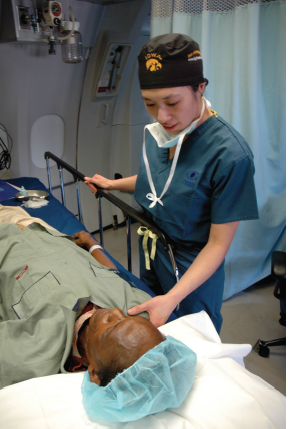 The University of Iowa provides a global perspective. Ophthalmology Residents have an opportunity to participate in an international training experience during their third year of training. This experience exposes residents to different health care systems around the world and helps shape practice and career choices. In some cases, residents travel with Iowa alumni on global health and mission trips. Our residents have traveled to places such as Nigeria, Philippines, India, Peru and the Dominican Republic.
The University of Iowa provides a global perspective. Ophthalmology Residents have an opportunity to participate in an international training experience during their third year of training. This experience exposes residents to different health care systems around the world and helps shape practice and career choices. In some cases, residents travel with Iowa alumni on global health and mission trips. Our residents have traveled to places such as Nigeria, Philippines, India, Peru and the Dominican Republic.
Quick Facts
By the Numbers
- Number of residents accepted each year: 6
- ACGME approved residents for our training program: 16
- Length of Residency: 3 years
- Graduates who go on to fellowships: 54%
- Faculty Members who train Ophthalmology residents: 28
Required rotations
- 1st and 2nd year: four of five 10-12 week rotations are scheduled at University of Iowa Hospital
- One rotation annually is at the VAMC, Iowa City
- 3rd year: one of five rotations is in Des Moines at the VA Medical Center
Benefits
- Competitive Stipends
- Comprehensive medical, dental, hospitalization and pharmacy benefits for residents/fellows and their dependents
- Vacation each year: 3 weeks
Board Certification Requirements
- Visit the American Board of Ophthalmology for specifics on board certification requirements
Contact Us
Laura Pitlick, Resident Program Coordinator
Department of Ophthalmology and Visual Sciences
University of Iowa Hospitals & Clinics
200 Hawkins Drive, Iowa City, Iowa 52242-1091
319-353-8585
e-mail: laura-pitlick@uiowa.edu
Ophthalmology Resident Surgery Statistics
Surgical Statistics for Ophthalmology Residency Graduates
| RRC Minimums | 2019 National 50% | 2019 Iowa Averages | |
|---|---|---|---|
| Cataract | 86 | 197 | 279.2 |
| YAG Capsulotomy | 5 | 20 | 34.2 |
| Laser trabeculoplasty | 5 | 12 | 8.4 |
| Laser iridotomy | 4 | 13 | 7.6 |
| Panretinal laser photocoagulation | 10 | 23 | 34.6 |
| Keratoplasty | 5 | 8 | 17.4 |
| Pterygium/conjunctival and other cornea | 3 | 6 | 21.0 |
| Keratorefractive Surgery | 6 | 9 | 11.8 |
| Strabismus | 10 | 19 | 38.6 |
| Glaucoma - Filtering/shunting procedures | 5 | 13 | 23.0 |
| Retinal vitreous | 10 | 22 | 16.2 |
| Intravitreal injection | 10 | 96 | 63.2 |
| Oculoplastic and orbit | 28 | 61 | 125.0 |
| Eyelid laceration | 3 | 8 | 17.8 |
| Chalazia Excision | 3 | 7 | 5.6 |
| Ptosis/blepharoplasty | 3 | 15 | 58.8 |
| Globe Trauma | 4 | 8 | 12.0 |
FAQ From Ophthalmology Residency Applicants
We are asked a number of questions about the residency program, about Iowa City, about the University of Iowa. Below are some short answers. You may find much more about Iowa, Iowa City, the University of Iowa, and general information about residencies at Iowa at the GME web site.
- Where is Iowa City?
- What's the weather like in Iowa City?
- What is there to do in Iowa City when you're not working?
- What's Iowa City like for kids and families?
- Are there any job opportunities for my spouse/significant other?
- Is this a family friendly program?
- How ethnically diverse are the patients?
- What are the fellowship opportunities available?
- Is there sufficient patient volume so that I can have multiple exposures to a variety of eye diseases and conditions?
- What is the program's balance between primary and specialty care?
- What are the on-call expectations of ophthalmology residents?
- What makes a great resident?
- Is there a research requirement for graduation?
- What's so good about Iowa?
- What is the pay and benefit package?
- Other Questions? Contact Laura Pitlick
What is Iowa City Like?
Where is Iowa City?

Iowa City is 220 miles directly west of Chicago on Interstate 80. It's also within a 4 to 5 hour drive to Milwaukee, Madison, Minneapolis, Omaha, Kansas City and St. Louis. It has the cultural, educational, social and political opportunities of a bigger city with the values and ambiance of a midwestern town. It's clean, safe, nothing is farther than a 20 minute car ride, it has a great city bus system (with bike racks!), wonderful parks, bike and hiking trails, sports, schools and even sailing. Those who have lived here and left, frequently return because what they were looking for was in their own back yard.We're not the only ones who think Iowa City is great:
Iowa City is frequently recognized as a best place to live by national publications. Since 2010, Iowa City has appeared on more than 40 such lists, including being named as:
- "Healthiest Town in the United States," Men's Journal, February 2010
- #2 "Best Places for Business and Careers" list (smaller metros), Forbes, April 2010
- #5 "Top 10 Cities for Book Lovers," Livability.com, September 2011
- #6 "The 10 smartest cities in America", MarketWatch, July 2015.
- "Top City for Starting Over in 2012," TheStreet.com, January 2012
- #10 "10 Best Cities for Singles," Kiplinger, April 2012
- #3 "Best place to live in America," Outside Magazine, August 2015
- Livability.com ranked Iowa City 9th on its list of Top 100 Best Places to Live 2016
In 2008, Iowa City became the world’s third United Nations Educational, Scientific and Cultural Organization (UNESCO) City of Literature, following Edinburgh, Scotland and Melbourne, Australia. The Iowa Writers’ Workshop, based at the University of Iowa, is one of the world’s foremost programs in creative writing; workshop alumni have won 12 Pulitzer Prizes and four alumni have been named U.S. Poet Laureate.
What's the weather like in Iowa City?
It depends on what you like. Our weather was a lot better than the East Coast this year! For about two weeks every winter it's very cold and windy and for two weeks every summer it's really hot and humid. For the rest of the time it's pretty nice. We consider our weather character building.
- The average warmest month is July and the coolest month is January.
- High temperatures between May and September are between 73 and 87 degrees (Yearly Avg. 60.9).
- The average low temperatures between October and April range from 15 degrees to 42 degrees (Yearly Avg. 39.8).
- Average number of sunny days is 166.
- The highest recorded temperature was 104°F in 1988.
- The lowest recorded temperature was -26°F in 1996.
- The maximum average precipitation occurs in June, average annual rainfall is 35.2".
- Average snowfall is 28" (with an average of 16 days of measurable snowfall per winter).
- Check today's weather (from the National Weather Service)
What is there to do in Iowa City when you're not working?
There are 15 different festivals and art fairs, plus concerts and race events. There are many music venues, sports events and neighborhood street fairs and garden walks. We also have a really big mall and several smaller ones, 50 parks, 9 golf courses, 6 public tennis courts, 6 public pools, some lakes and a reservoir with trails, camping & boating. There are hiking and bike trails, some famous bookstores, a ton of galleries and excellent museums. There are half a dozen or more performing arts venues. There's always something going on.
- Travel and Events (this will take you to our information at the GME Site)
- University of Iowa Events List
- What's happening in Iowa City/Coralville?
What's Iowa City like for kids and families?
There's ice skating, bowling, organized sports, public parks, miniature golf, a great public library, a toy library, fun centers, swimming pools and 3 beaches, 9 museums including a children's museum, dance companies and public recreation centers that feature many activities for kids and families at little or no cost. We also have 20 movie screens and 50-licensed daycare providers. The Iowa City schools are perennially ranked among the top schools in the nation. Iowa City is unique in the facilities and services available for individuals with disabilities. Many families who have a family member with a disability are reluctant to leave Iowa City because they cannot duplicate those services in another location.
It's a great place to live, but don't just take our word for it, see what others are saying:
- 30 things you need to know about Iowa City
- Iowa's Creative Corridor: Pick Your Pace
- Iowa City Area Development: About living here
Are there any job opportunities for my spouse/significant other?
Yes, in August 2019, Iowa City had an average of 2.1% unemployment (compared to 2.8% in the state of Iowa and 3.7% nationwide). Also check out The University of Iowa's Dual Career Network.
Is this a family friendly program?
We love children and support residents in their efforts to balance work with family life. We have several dual physician resident and faculty families and understand the stresses. Women residents receive up to 6 weeks of paid maternity leave after delivery. Men get 5 working days off for paternity leave. The house staff health insurance policy provides full coverage for spouses and children. There are several childcare facilities near the hospital and one on-site. The training program also has activities during the year where all family members are invited.
How ethnically diverse are the patients?
Like a lot of university towns, we have a large international community. Growing cultural diversity is another reason Iowa City is an interesting place to live. Diversity is embraced and celebrated with city and university events, festivals, clubs and programs. The University works hard to recruit and retain minorities with its affirmative action policies. About 15% of Iowa Citians are non-white, this percentage is paralleled in our clinics.
What are the fellowship opportunities available?
Ten to 12 fellows train in our accredited fellowship programs each year. We have fellowships in all of our sub-specialty areas. Most are one-year fellowships but 2-year fellowship opportunities are available as well. About half of our residents enter fellowships immediately after graduation.
Is there sufficient patient volume so that I can have multiple exposures to a variety of eye diseases and conditions?
Our patients represent all age groups and all socioeconomic strata and they present with virtually all acute and chronic conditions of the eye.
With nearly 64,000 annual patient visits you will see plenty of the most common eye conditions and many of the less common ones as well. Our clinical practice serves the general eye care needs of the local community and the sub-specialty needs of the region. The UIHC is a tertiary care center and our department receives referrals for specialized services from Iowa and neighboring states. Some patients travel from outside the continent to be seen by our physicians.
In an average year, patient visits per sub-specialty are approximately:
- Cornea: 7,000
- Comprehensive Ophthalmology: 14,400
- Glaucoma: 7,300
- Neuro-Ophthalmology: 2,650
- Oculoplastic Surgery: 6,300
- Contact Lens: 4,100
- Pediatric Ophthalmology: 9,800
- Retina/Vitreous: 20,000
- Vision Rehabilitation: 3,700
- Other: 1,600
The surgical statistics for ophthalmology resident graduates will give you an idea of how many surgeries you may encounter over your three-year residency: Surgical Statistics for Ophthalmology Residency Graduates.
What is the program's balance between primary and specialty care?
We seek to provide each resident physician with a sufficiently broad experience that he or she can choose wisely among all the options to pursue a career in ophthalmology in private practice, group practice, or an academic career. About half of our graduates go on to private practice while the remainder go on to fellowships in ophthalmic subspecialties or academic ophthalmology.
What are the on-call expectations of ophthalmology residents?
Call is divided into first call, backup call, and faculty call for Retina, Oculoplastics, Neuro-ophthalmology, as well as general call. Resident call schedules are prepared by the residents. The week day calls are split by the first and second year residents. Weekends and holidays are covered by first year residents. Third year residents provide back up call. Residents are not placed on the call schedule during their first 2 months in the department. At-home call must not be so frequent as to preclude rest and reasonable personal time for each resident. Residents taking at-home call are provided with one day in 7 completely free from all educational and clinical responsibilities, averaged over a 4-week period. (call schedule)
What makes a great resident?
As part of an interview for Pearls of Ophthalmology, our residency program director, Dr. Tom Oetting addressed this question and an excerpt from this interview follows:
"A great ophthalmology resident is hard to define but when you see it, you know it. A great resident has infectious enthusiasm for our great profession and the science of the eye. He or she enjoys working with patients and wants more clinic opportunities, more surgical opportunities, and more chances to learn. A great resident makes our patients feel cared for and special. A great resident is coach-able (i.e. learns from his or her mistakes and moves on). A great resident is a great teacher and creates a sea of medical students interested in ophthalmology. A great resident gets things done when they said they would. A great resident does their dictations, notes, work hour requests, faculty evaluations, and the other important administrative jobs on time and with no fanfare. A great resident gives more than he or she takes. And like a good camper, a great resident leaves our program better than when they arrived"
Is there a research requirement for graduation?
Yes, participation in research is an integral part of the training experience. During the first year, residents develop a research plan for conducting at least one research project. All projects are done in collaboration with a faculty preceptor who will supervise all phases of the project. Each resident presents the results of his/her research at the department's resident and fellow research day. The initial presentation is made in the spring of the first year even when the results are in the pilot or preliminary stages. Updated presentations are made in the spring of subsequent years revealing the maturing or completed project. While some projects will not result in a published manuscript, our residents are co-authors on a number of published papers each year.
What's so good about Iowa?
- Our faculty are really nice, and exceptionally dedicated teachers too.
- We have a diverse faculty with wide-ranging clinical and research interests.
- Some of our faculty are internationally known and have been with us for many years.
- We also have several bright young faculty who bring new interests and enthusiasm to the practice.
- You work with and learn directly from faculty on all rotations.
- All the subspecialties are represented in our training program.
- Our programs, clinical, research, and teaching are consistently ranked in the top ten nationally.
- The clinics, hospital, and inpatient units are located within a single hospital, with 1 rotation per year at the VAMC located just across the street. The ASC is conveniently located directly above the clinic at both locations. (No hours of commuting through traffic daily to get to work.) .
- You have access to a locked resident room with your own desk, file, phone, internet port, and personal space.
- A dedicated ophthalmology library located directly below the clinic with a world-class librarian.
- A state-of-the art EMR system (EPIC), with the ability for both remote and mobile access
- Our residents are great people and they make exceptional ophthalmologists.
- Iowa City is a highly intellectual community (Iowa City has been named a UNESCO City of Literature) with an abundance of arts and culture events that are accessible to residents both in terms of cost and location.
- A competitive stipend and benefits in a region with very low cost of living
- We have an outstanding school system for children in grades K-12.
- A great training program and a high quality of life
- We want you to succeed.
Benefits
For more information about pay, benefits, general GME policies and much more, take a look at the University of Iowa GME web site.
More Questions?
If you have additional questions please contact our program coordinator at laura-pitlick@uiowa.edu
Accreditation and Board Certification
Accreditation of Ophthalmology training PROGRAMS is provided by the Accreditation Council for Graduate Medical Education (ACGME). The ACGME sets general requirements for all residency training programs as well as special requirement and prerequisite information for each specialty. These requirements are enforced by the various Residency Review Committees (RRC). For additional information visit www.acgme.org.
ACGME-accredited programs in ophthalmology must be 36 months in length.
Certification of INDIVIDUALS trained in Ophthalmology is provided by the American Board of Ophthalmology (ABO). To be eligible for examination you must have satisfactorily completed 12 months of broad clinical training (PGY-1) and a formal residency training program in Ophthalmology of at least 36 months (some programs require 48 months). All training must be in accredited programs in the U.S. or in Canada. It is possible that a State Licensing Board will give you credit for foreign training, whereas the ABO will not. You should check with the ABO about this before you enter the match or start your training.
The Board Certification process must be completed not more than 6 years after your training. All Certificates require completion of a designated renewal program every 10 years. For more detailed information visit the American Board of Ophthalmology's website at www.abop.org.
How to Apply
How to Apply

Register with and apply through the Central Application Service of the Ophthalmology Matching Program:
Ophthalmology Matching Program
P.O. Box 7584
San Francisco, CA 94120-7584
Phone: 415-447-0350
FAX: 415-561-8535
Web Site: http://www.sfmatch.org
Resources
- We recommend reviewing Envision Ophthalmology for information about the matching program and a career in ophthalmology.
- EyeRounds.org has a tutorial that may be helpful in your application process:Comprehensive Approach for Application to an Ophthalmology Residency.
Information Regarding Policies
- For Prospective Residents
- Information about Physician Licensure in the State of Iowa, see the Iowa Board of Medical Examiners site.
- MedHub (requires login)
Applicant Information
Residency Eligibility Criteria
U.S. Medical School Graduates
- Passing USMLE scores with no previous failures. While USMLE Step 1 scores are only part of our review, we rarely interview candidates with scores less than 220.
- At least 3 letters of recommendation, Dean’s letter, medical school transcript, personal statement and photograph sent through the Ophthalmology Match.
- There are no specific requirements for the personal statement but in general it should explain why you are interested in ophthalmology and argue for why you would be a good candidate.
- History of research (not necessarily in the field of ophthalmology)
- Commitment to public service and teaching
- Prior to appointment in Ophthalmology, all residents must have successfully completed a post-graduate clinical year (PGY-1) in our ACGME-accredited program at The University of Iowa.
International Medical School Graduates
- Rarely we have taken international graduates into our program
- USMLE Step 1 and Step 2 scores of at least 240 on first attempt. Both scores must be available before you can be considered for an interview.
- Passing grade on the CSA or USMLE Step 2 CS on the first attempt.
- Medical school graduation date of 2008 or later.
- Previous ophthalmology residency experiences, observership or clinical experience in the US is strongly preferred.
- Previous degree in U.S., eg. PhD, MPH is desirable.
- At least 3 letters of recommendation, Dean’s letter, medical school transcript, personal statement and photograph sent through the Ophthalmology Match.
- There are no specific requirements for the personal statement but in general it should explain why you are interested in training in our program and argue for why you would be a good candidate.
- Appropriate medical education to train in a large U.S. teaching hospital.
- History of research (not necessarily in the field of ophthalmology)
- Commitment to public service and teaching
- Prior to appointment in Ophthalmology, all residents must have successfully completed a post-graduate clinical year (PGY-1) in our ACGME-accredited program at The University of Iowa.
- We sponsor J-1 Visas.
We accept applications only through the San Francisco Match.
American Board of Ophthalmology Certification
American Board of Ophthalmology Certification
The American Board of Ophthalmology (ABO) was the first medical specialty board founded in the United States. It awards the only medical specialty certificate in ophthalmology recognized by both the American Board of Medical Specialties (ABMS) and the American Medical Association (AMA).
Certification of individuals trained in Ophthalmology is provided by the American Board of Ophthalmology (ABO). To be eligible for examination you must have satisfactorily completed 12 months of broad clinical training (PGY-1) and a formal residency training program in Ophthalmology of at least 36 months (some programs require 48 months). All training must be in accredited programs in the U.S. or in Canada. It is possible that a State Licensing Board will give you credit for foreign training, whereas the ABO will not. You should check with the ABO about this before you enter the match or start your training.
The Board Certification process must be completed not more than 6 years after your training. All Certificates require completion of a designated renewal program every 10 years.
Additional information about ABO Certification may be found at the Board's website
Deadline
Ophthalmology is considered an "early match" specialty due to the annual January match. Consequently, the decision to pursue ophthalmology must be made earlier than most specialties
Applications must have been received by Oct. 6, 2023. (Please allow adequate time for document updating by the SF Match Computer system.)
We will be holding interviews on the following dates:
Tuesday, Nov. 28, 2023
Friday, Dec. 1, 2023
Monday, Dec. 4, 2023
PLEASE NOTE: To begin the joint internship, you must be available and licensed in Iowa by June 24.
Foreign Applicants
For information regarding policies as well as Visa issues, please contact the UI Graduate Medical Education Office
University of Iowa Hospitals and Clinics, C123-GH
200 Hawkins Drive, Iowa City, Iowa 52242
Phone: 319-356-2256.
Email: gmeoffice@uiowa.edu
The Interview
We will interview about 60 candidates for six positions beginning in late November and early December.
Interview Dates
- Tuesday, Nov. 28, 2023
- Friday, Dec. 1, 2023
- Monday, Dec. 4, 2023
What should I expect on the interview day?
When you are invited to interview you will receive more information by email regarding the interview day and schedule.
Our People
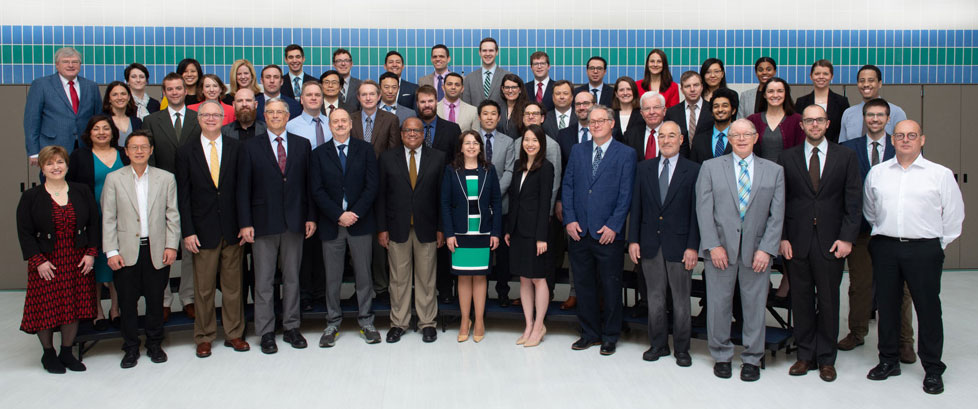
Our people are the heart of our program. From the reception desk to the exam room, from laboratory to diagnostic suite, from the auditorium to the library, from administration office to faculty office you will find our people eager to help you become the best ophthalmologist you can be.
At Iowa, you will be exposed to some of the best clinicians, researchers and teachers in our profession. We provide high-powered opportunities for you to learn career-long lessons from these dedicated professionals.
Contact Us
Laura Pitlick
Ophthalmology Residency Coordinator
Department of Ophthalmology and Visual Sciences
University of Iowa Health Care Medical Center
200 Hawkins Drive
Iowa City, IA 52242
Phone: 319-353-8585
Email: laura-pitlick@uiowa.edu
Current Residents and Interns
S. Bilal Ahmed, MD
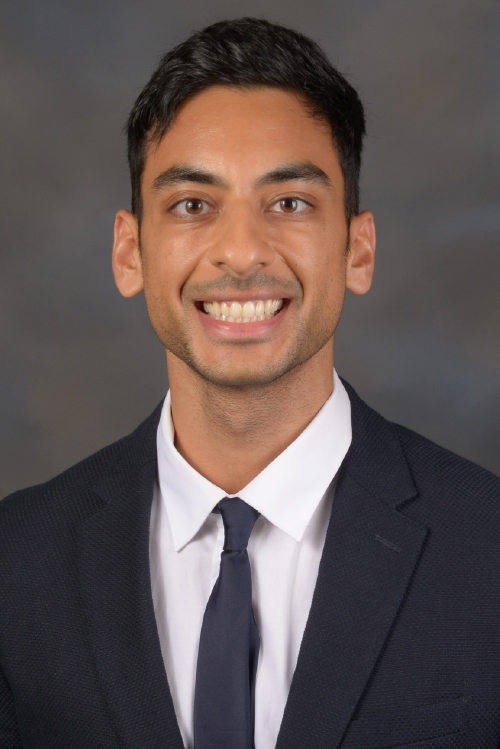
Ophthalmology Resident, 2022-2025
Why did you choose Iowa?
Iowa has a rich history of excellence in education, patient care, research, and producing leaders who contribute to the field of ophthalmology in a variety of meaningful ways. The focus on residents becoming well-rounded doctors and surgeons is the beating heart of this program. It is an honor to spend the next four years training at an institution with such talented, humble, and genuine people rooting for you from day one.
Oladipupo Anibire, MD
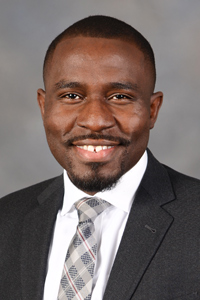
Why did you choose Iowa?
I knew immediately, upon receiving the invitation, how fortunate I was to have been selected for an interview from such an excellent training institution. I spoke to countless people during my journey towards matching into ophthalmology, and they could not stop speaking highly of Iowa. The unparalleled emphasis on resident education, the camaraderie among residents, the family-friendly training environment, and the opportunity to learn from world-renowned faculty members, and Iowa City being a wonderful place to raise a family made choosing Iowa an easy decision.
Dr. Anibire's academic profile
Brandon Baksh, MD
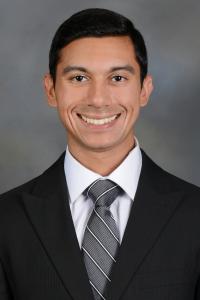
Ophthalmology Resident, 2023-2026
Donavon Dahmer, MD
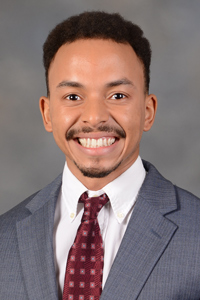
Why did you choose Iowa?
I chose Iowa for three reasons: the immediate warm & welcoming culture of faculty and residents, the outstanding educational curriculum that emphasizes teaching & developing competent ophthalmologists, and the substantial focus on resident well-being. It was very apparent from the interview that Iowa would value me not only as a resident but as a person. And that was exactly the kind of environment I wanted to spend the next four years training in.
Patrick Donegan, MD
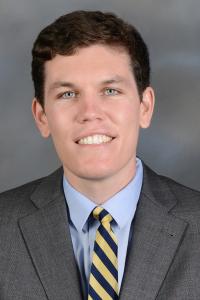
Ophthalmology Resident, 2023-2026
Why did you choose Iowa?
I had heard about Iowa’s ophthalmology from my mentors in medical school for years, so when I had the chance to interview, I was elated. It seemed to be the perfect balance of terrific clinical and surgical training with world-renowned faculty and a collegial culture that allows one to retain their sanity. It obviously took a leap of faith to come here but I wanted to go to a program that would prepare me for anything after I graduate, be it comprehensive practice or fellowship.
Dr. Donegan's academic profile
Arnulfo Garza Reyes, MD
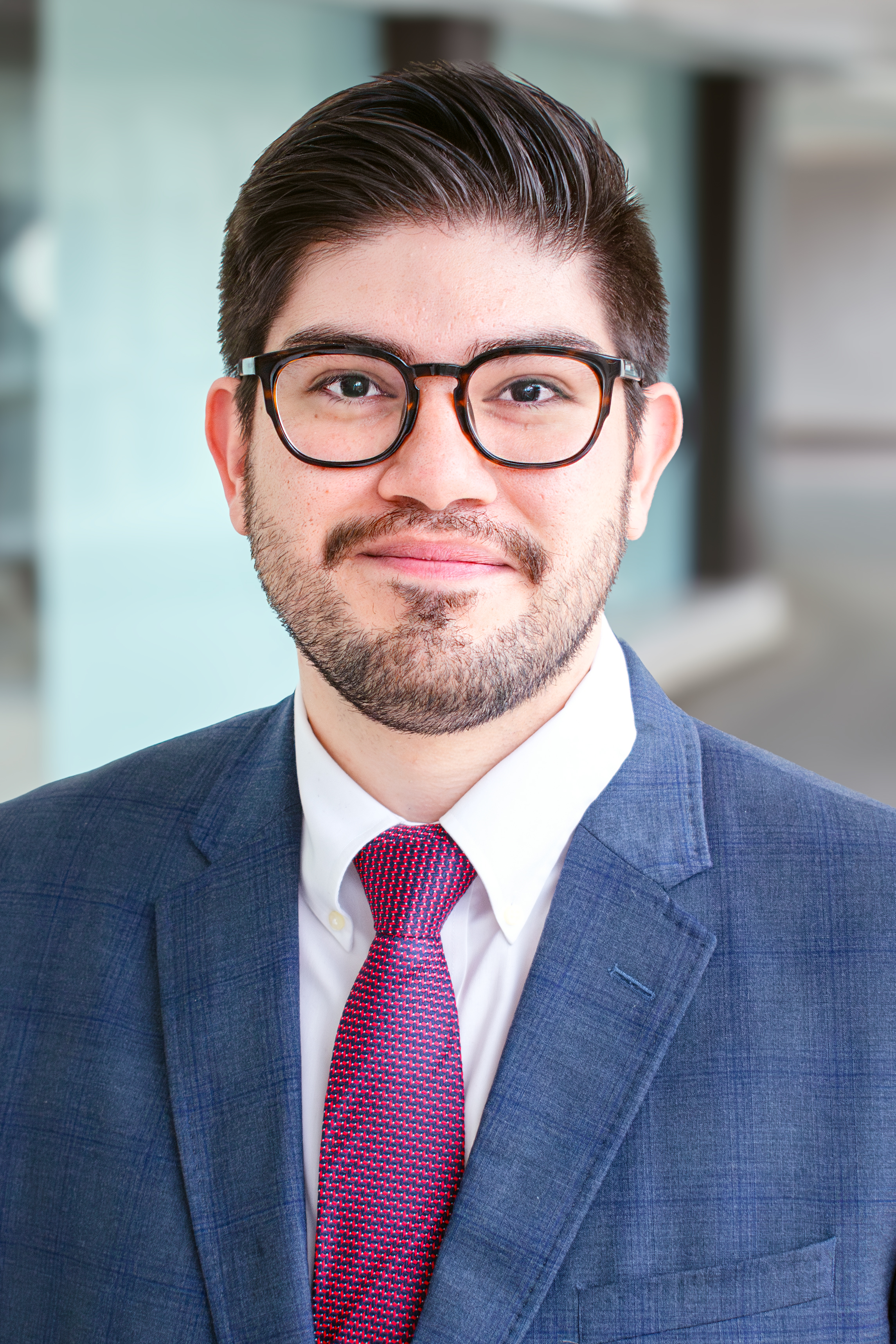
Ophthalmology Resident, 2022-2025
Why did you choose Iowa?
All residency programs in the country will train a competent ophthalmologist, but very few will offer you world-class training suited for any kind of practice you can imagine. Additionally, very few eye institutes will offer you a resident-driven culture. Iowa is that and more which makes it a unique place at the top of the rankings. Educating you is the priority of every faculty member, and you will find a leader in the field in every subspecialty here at Iowa. I have the goal of going back to the southern border of the country and serving my people as there is a huge need, so it was clear to me that I wanted a place that could offer me elite training to impact my community. I am uncertain about my specialty preference at this point but it gives me peace of mind knowing that graduates from Iowa are widely-known for being capable of excelling right after finishing residency. If I decide to pursue a specialty, the strength of the program and department in general along with the support of the faculty would set me up for success. When you consider residency programs, remember to keep in mind the program’s ability to set you up for a successful career...but the important thing is that success should be defined by you and your own goals. I knew that at Iowa I can come out a well-trained surgeon with experiences that will allow me to shape my career into exactly what I want. Very few places in the country can give you that luxury. To do all of that in a friendly and supportive environment is more than I could have asked for. This is the place to be.
Marshall Henrie, MD
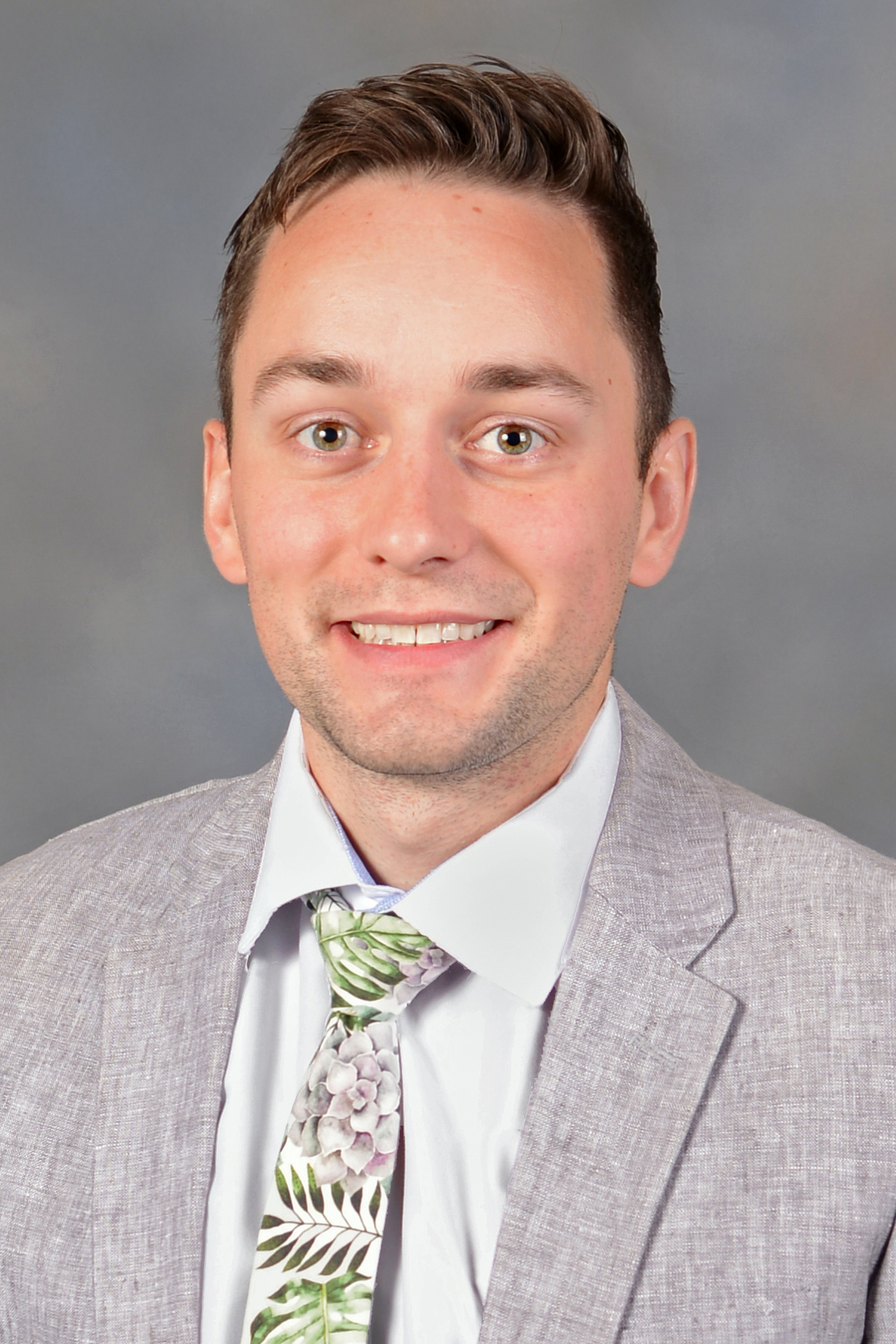
Why did you choose Iowa?
When looking at different residency programs, I was looking for a place with reputable teachers and a strong history of good surgical and clinical training. Iowa exceeded all my expectations during the away rotation that I did here prior to applying. Not only are all the faculty great teachers, all the staff here are welcoming and encouraging. It’s also a great place to live if you have a family! If I had to choose again, I’d pick Iowa in a heartbeat.
Matthew Hunt, MD
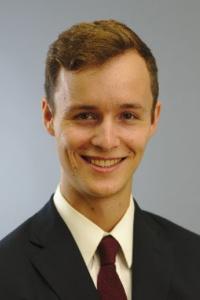
Ophthalmology Resident, 2023-2026
Why did you choose Iowa?
Iowa has the nicest culture, great clinical volume combined with intentional structured teaching, and interesting research opportunities.
Chad 'Cy' Lewis, MD
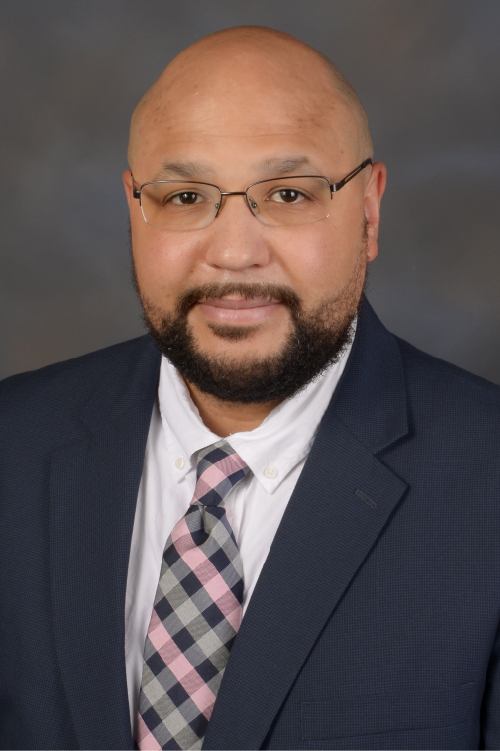
Ophthalmology Resident, 2022-2025
Why did you choose Iowa?
I chose Iowa because of the genuinely supportive and friendly culture they've built here that allows for a strong work-life balance. It's easy to see that our residents not only receive a spectacular education from many prominent leaders in the field of ophthalmology, but they also have a great time while doing it.
Matthew Meyer, MD
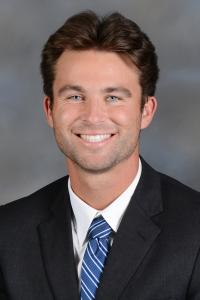
Ophthalmology Resident, 2023-2026
Why did you choose Iowa?
As a medical student here on rotations, it was immediately apparent to me how supportive and friendly the ophthalmology department is as a whole. From attendings, to residents, and to staff, everyone included me as part of the team. That great culture and along with well-rounded clinical and surgical training that is among the best in the country made Iowa an easy choice.
Paige Noble, MD
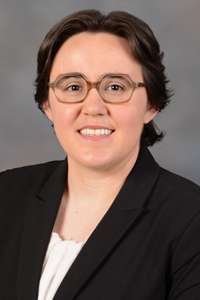
Why did you choose Iowa?
I deeply value the combination of excellent training housed in a department with a kind, collaborative culture.
Adetayo Oladele-Ajose, MD
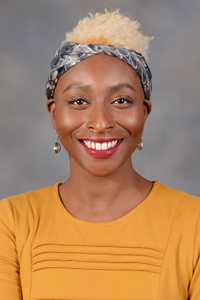
Why did you choose Iowa?
I came to University of Iowa when I was a wee babe of 15 years old, so in effect, Iowa City raised me. Because of my limited world experience at the time, I did not realize just how genuinely special and rare Iowa City/University of Iowa was until I left and experienced life elsewhere. The people here are so kind and unfettered in how they care for you. The program itself is top of the line and they value and protect your education. I felt supported and covered by the program when I did my away before I even was part of the department. It honestly felt like coming home, so I had to choose Iowa!
Dr. Oladele-Ajose's academic profile
Zachary Richards, MD
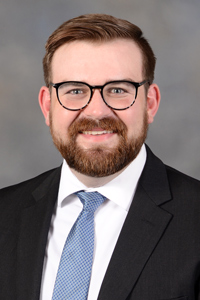
Why did you choose Iowa?
I chose Iowa because there's no program that better blends excellence with warmth so effortlessly. On interview day, I felt seen for my values and experiences, not just an academic record or a list of publications. Iowa has all you can ask from a top program: a storied history as one of the first dedicated ophthalmology departments in the country with enormous alumni reach and influence, a faculty that is completely bought in on training clinically elite residents, ample opportunities for research and advocacy, and a culture of dignity and respect that was instantly recognizable.
Dr. Richards' academic profile
Joanna Silverman, MD
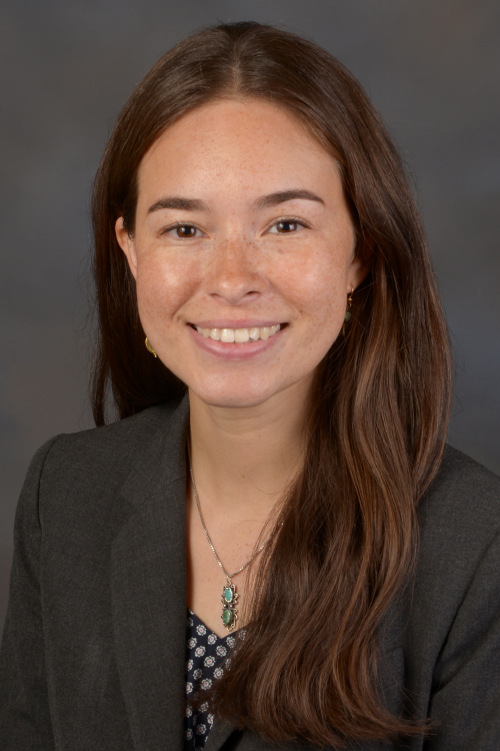
Ophthalmology Resident, 2022-2025
Why did you choose Iowa?
I went to medical school at Iowa, and it was here where I learned just how impactful the work of ophthalmologists are. The department is home to some big role models of mine, and I learned first-hand just how excited the physicians/residents at Iowa are to go out of their way to help cultivate our skills and passions as learners. As a frequent over-thinker, this was an easy gut decision.
Dr. Silverman's academic profile
Samuel Tadros, MD
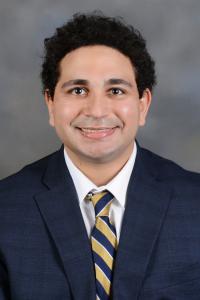
Ophthalmology Resident, 2023-2026
Why did you choose Iowa?
To me, Iowa stood out as a top program that offered excellent clinical and surgical training. You can craft whatever path you like here, whether that is as a high-volume surgeon in private practice or a research minded academic clinician. Iowa will train you for anything, and you will have fun doing it too!
Jonathan Trejo, MD
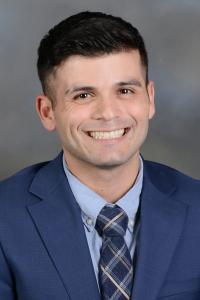
Ophthalmology Resident, 2023-2026
Why did you choose Iowa?
As someone who was for sure motivated to stay on the west coast, I couldn’t help but notice how the culture of Iowa is like no other. Every resident here is truly treated like a family member. I could immediately tell during interview day (that has been confirmed while I’ve been here) that we all look out for each other and are encouraged by our faculty and colleagues to learn, grow, and welcome what we all bring to this world-renown institution. I am so glad I chose to come here because I know I will receive the best training I can bring to my patients, peers, and mentees and have already made friendships and mentors that will be lifelong.
Cheryl Wang, MD
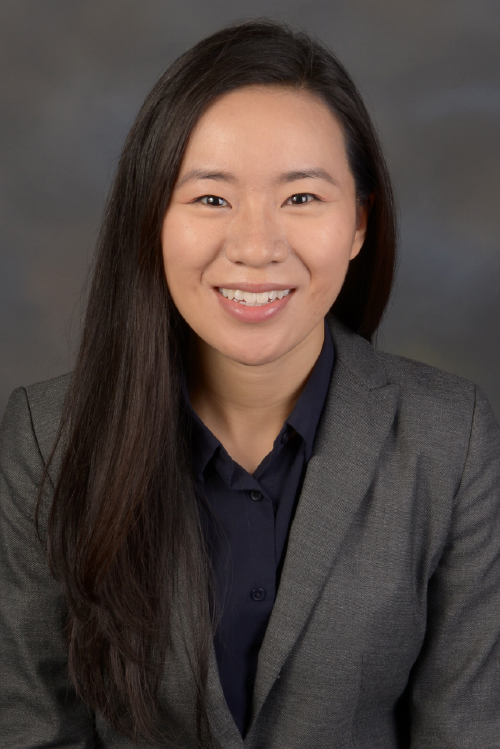
Ophthalmology Resident, 2022-2025
Why did you choose Iowa?
I chose Iowa because of the culture. I have met so many people here who are not only super interesting and impressive but also humble, down-to-earth, and really pleasant to be around. I can recall many moments from being a medical student here where people went the extra mile for me or were generous towards me with their time, effort, and consideration, even if I was a stranger to them. These memories have made a lasting impression on me and represent the kind of physician and person I would like to become.
Transitional Interns, Ophthalmology Resident 2025-2028
Noor-Us-Sabah Ahmad, MD
Ella Gehrke, MD
Nicolas Heckenlaible, MD
Thomas Meram, MD
Peter Sanchez, MD
Lauren Tomlinson, MD
Our Recent Graduates
Approximately half of our graduates enter private practice immediately upon completion of the 3-year residency. Others pursue fellowship training before going into practice or entering an academic career. Regardless of a resident or fellow's choice of career path, he or she should feel fully confident of having received the best possible training in ophthalmology. As part of the Iowa Ophthalmology Family, they have worked with dedicated and experienced faculty in a contemporary and world-renowned program. We believe at the completion of training, graduates of the University of Iowa Department of Ophthalmology and Visual Sciences are prepared for the challenges ahead and can look forward to the fulfillment that comes from pursuing a career that fosters life-long education.
The department has over 800 alumni across the country and around the world who have become leaders in academic medicine, vision research and private practice. We retain close relations with many of our alumni and offer a network of connections for residents and fellows in training.
Residents have opportunities to meet and network with Iowa alumni throughout the year. Our Clinical Conferences throughout the year and annual Iowa Eye Association meeting held each summer bring alumni back to Iowa City for continuing education and socializing with their mentors and colleagues. We also host informal sessions where alumni meet with trainees to discuss career planning and the business side of ophthalmology. These Alumni Roundtables provide valuable perspectives on a career in ophthalmology and life after training.
2024
Aaron D. Dotson, MD
Cornea Fellowship, UC San Francisco, San Francisco, CA
Andrew Goldstein, MD
Shepard Eye Center, Santa Maria, CA
Tina M. Hendricks, MD
Comprehensive Ophthalmology, University of Iowa Health Care, Iowa City, IA
Mahsaw Mansoor, MD
Medical Retina Fellowship, Kellogg Eye Center, Ann Arbor, MI
Sean Rodriguez, MD
Vitreoretinal Disease and Surgery Fellowship, University of Colorado, Aurora, CO
2023
Matthew G. Field, MD, PhD
Cornea/Anterior Segment Fellowship, Minnesota Eye Consultants Minneapolis, MN
Zachary Q. Mortensen, MD
Eye Associates of Colorado Springs Colorado Springs, CO
Tirth J. Shah, MD
Georgia Eye Clinic Atlanta/Athens, GA
Margaret R. Strampe, MD
- Pediatric Ophthalmology and Strabismus Fellowship, University of Iowa, Iowa City, IA
- St. Paul Eye Clinic, St. Paul, MN
Caroline Y. Yu, MD
Oculofacial Plastic Surgery Fellowship, Mayo Clinic Rochester, MN
2022
Karam A. Alawa, MD
- Glaucoma Fellowship, Mass Eye & Ear, Boston
- Center for Excellence in Eye Care, Miami, Florida
Justine (Liang) Cheng, MD
Vitreoretinal Fellowship, Oregon Health and Science University, Portland, Ore.
Salma A. Dawoud, MD
- Neuro-Ophthalmology Fellowship, University of Iowa Hospitals & Clinics, Iowa City, Iowa
- Oculoplastics Fellowship, Medical College of Wisconsin, Milwaukee
Ryan J. Diel, MD
Comprehensive Ophthalmology, University of Iowa Health Care, Iowa City, IA
David A. Ramirez, MD
- Pediatric Ophthalmology Fellowship, Children's Hospital of Philadelphia, Philadelphia
- Ann & Robert H. Lurie Children’s Hospital of Chicago, Chicago, Illinois
2021
Christopher R. Fortenbach, MD, PhD
- Vitreoretinal Surgery Fellowship, University of Iowa Hospitals & Clinics, Iowa City, Iowa
- University of Washington, Seattle, Wa.
Lauren E. Hock, MD
- Glaucoma Fellowship, Wills Eye Hospital, Philadelphia, Pa.
- Wills Eye Hospital, Philadelphia, Pa.
Tyler S. Quist, wMD
- Glaucoma Fellowship, University of Iowa Hospitals & Clinics, Iowa City, Iowa
- Private Practice, Eye Associates of Colorado Springs, Colorado Springs, CO
Alexis K. Warren, MD
- Vitreoretinal Surgery Fellowship, University of Illinois – Chicago, Chicago
- University of Chicago Medicine, Chicago
Caroline W. Wilson, MD
- Cornea, External Disease and Refractive Surgery Fellowship, Vance Thompson Vision, Sioux Falls, S.D.
- Private Practice, Wolfe Eye Clinic, Hiawatha/Iowa City, Iowa
2020
Anthony T. Chung, MD
University of Washington, Seattle, Wa.
Ben J. Janson, MD
Fuerste Eye Clinic, Dubuque, Iowa
Matthew Benage, MD
Vancouver Clinic, Vancouver, Wash.
Austin R. Fox, MD
- Glaucoma Fellowship, University of Iowa Hospitals & Clinics, Iowa City, Iowa
- UC Irvine Gavin Herbert Eye Institute, Irvine, CA
Heather A. Stiff, MD
- Pediatric Ophthalmology and Strabismus Fellowship, University of Iowa Hospitals & Clinics, Iowa City, Iowa
- Eye Institute - Froedtert & Medical College of Wisconsin, Milwaukee
2019
Stephanie K. Lynch, MD
- Medical Retina Fellowship, Emory University, Atlanta
- Private practice, Eye Specialists of Georgia, Atlanta
Spenser J. Morton, MD
Private practice, Vance Thompson Vision, Sioux Falls, S.D.
Aaron M. Ricca, MD
- Vitreoretinal Surgery Fellowship, University of Iowa Hospitals & Clinics, Iowa City, Iowa
- Retina Associates of Kentucky, Lexington, KY
Brittni A. Scruggs, MD, PhD
- Vitreoretinal Surgery Fellowship, Casey Eye Institute, Oregon Health & Science University, Portland, Oreg.
- Adult and Pediatric Vitreoretinal Surgeon, Mayo Clinic, Rochester, Minn.
Daniel C. Terveen, MD
- Cornea, External Disease and Refractive Surgery Fellowship, Vance Thompson Vision, Sioux Falls, S.D.
- Private practice, Vance Thompson Vision, Sioux Falls, S.D.
2018
Lindsay M. De Andrade, MD
- Pediatric Ophthalmology Fellowship, University of California, Stein Eye Institute, Los Angeles
- Pediatric Ophthalmology, University of Iowa Hospitals & Clinics, Iowa City, Iowa
Thomas J. Clark, MD
- Oculoplastics Fellowship, Medical College of Wisconsin, Milwaukee
- Private practice, Eye Surgical Associates, Lincoln, Neb.
Matthew A. Miller, MD
- Glaucoma Fellowship, University of Iowa Hospitals & Clinics, Iowa City, Iowa
- Private practice, Eye Associates of Colorado Springs, Colorado Springs, Colo.
Lorraine M. Provencher, MD
- Glaucoma Fellowship, Kellogg Eye Center, University of Michigan, Ann Arbor, Mich.
- Private practice, Cincinnati Eye Institute, Cincinnati
Tyler B.S. Risma, MD
Fuerste Eye Clinic, Dubuque, Iowa
2017
Steven M. Christiansen, MD
Vitreoretinal Surgery Fellowship, Cincinnati Eye Institute, Cincinnati
William E. Flanary, MD
Eye Health Northwest, Portland, Ore.
Jaclyn M. Haugsdal, MD
- Iowa Eye Center, Cedar Rapids, Iowa
- Comprehensive Ophthalmology, University of Iowa Hospitals & Clinics, Iowa City, Iowa
Lucas T. Lenci, MD
Private practice, Missouri Eye Institute, Springfield, Mo.
Prashant K. Parekh, MD, MBA
- Vitreoretinal Surgery Fellowship, Cincinnati Eye Institute, Cincinnati
- Private practice, Center for Excellence in Eye Care, Miami
2016
Johanna Dijkstal Beebe, MD
- Neuro-ophthalmology Fellowship, University of Iowa Hospitals & Clinics, Iowa City, Iowa
- Private practice, Park Nicollet Hospitals, Minneapolis
P. Christi Carter, MD
Alamo City Eye Physicians, San Antonio
Christopher Kirkpatrick, MD
Private practice, Eye Center of Northern Colorado, Fort Collins, Colo.
Philip Niles, MD, MBA
- Vitreoretinal Surgery Fellowship, University of Toronto, Ontario, Canada
- Private practice, Buffalo Niagara Retina, Williamsville, N.Y.
David Phillips, MD
- Glaucoma Fellowship, University of Utah, Salt Lake City
- Private practice, Quincy Medical Group, Quincy, Ill.
2015
Jonathan Hager, MD
Private practice, Riverhill Ophthalmology PA, Kerrville, Texas
C. Blake Perry, MD
- Oculoplastic and Orbital Surgery Fellowship, Casey Eye Institute, Portland, Ore.
- Private practice, Eyeplastics, La Jolla, Calif.
Bradley Sacher, MD
Private practice, Wheaton Eye Clinic, Wheaton, Ill.
Jesse Vislisel, MD
- Cornea Fellowship, University of Iowa Hospitals & Clinics, Iowa City, Iowa
- Private Practice, Associated Eye Care, Stillwater, Minn.
Jeffrey Welder, MD
Private practice, Siskiyou Eye Center, Ashland, Ore.
2014
Elizabeth Gauger, MD
- International Ophthalmology Fellowship, Dean McGee Eye Institute, Oklahoma City
- Private practice, Iowa Eye Center, Cedar Rapids, Iowa
Pavlina Kemp, MD
- Pediatric Ophthalmology Fellowship, Massachusetts Eye and Ear Hospital, Boston
- Pediatric Ophthalmology, University of Iowa Hospitals & Clinics, Iowa City, Iowa
Angela McAllister
Private practice, Essentia Health, Duluth, Minn.
Justin Risma, MD
Private practive, Fuerste Eye Clinic, Dubuque, Iowa
Matthew Weed, MD
- Ophthalmic Genetics Fellowship, University of Iowa Hospitals & Clinics, Iowa City, Iowa
- Pediatric Ophthalmology Fellowship, University of Iowa Hospitals & Clinics, Iowa City, Iowa
2013
Meredith Baker, MD
- Oculoplastic and Orbital Surgery Fellowship, University of Iowa Hospitals & Clinics, Iowa City, Iowa
- Private practice, Minnesota Ophthalmic Plastic Surgery Specialists, Edina, Minn.
- Private practice, Spokane Eye Clinic, Spokane, Wash.
Joey Brinkley, MD
- Neuro-Ophthalmology Fellowship, University of Iowa Hospitals & Clinics, Iowa City, Iowa
- LSU Health, Shreveport, La.
John J. Chen, MD, PhD
- Neuro-Ophthalmology Fellowship, University of Iowa Hospitals & Clinics, Iowa City, Iowa
- Mayo Clinic, Rochester, Minn.
Amanda Maltry, MD
- Ocular Pathology Fellowship, University of Iowa Hospitals & Clinics, Iowa City, Iowa
- University of Minnesota, Minneapolis
Jordan Rixen, MD
- Cornea and External Disease Fellowship, University of Iowa Hospitals & Clinics, Iowa City, Iowa
- Private practice, Eye Surgical Associates, Lincoln, Neb.
2012
Priya Gupta, MD
- Glaucoma Fellowship, Wilmer Eye Institute, Baltimore
- Private practice, West Coast Glaucoma Centre, Vancouver, British Columbia, Canada
Esther S. Hong, MD
Comprehensive ophthalmology, Kaiser Permanente, Oakland, Calif.
Shaival S. Shah, MD
- Pediatric Ophthalmology Fellowship, University of Wisconsin, Madison, Wis.
- Private practice, Southern California Permanente Group, Yorba Linda, Calif.
Matthew S. Ward, MD
- Cornea and External Diseases Fellowship, University of Iowa Hospitals & Clinics, Iowa City, Iowa
- Private practice, Provo, Utah
Christopher E. Watts, MD
Private practice, Eye Physicians and Surgeons, Iowa City, Iowa
2011
Emily S. Birkholz, MD
Private practice, Ophthalmology Associates of Mankato, Mankato, Minn.
Jason P. Brinton, MD
- Cornea Fellowship, Durrie Vision, Overland Park, Kan.
- Private practice, Durrie Vision, Overland Park, Kan.
Leslie T. L. Pham, MD
- Cataract/Refractive Surgery Fellowship, Koch Eye Associates, Warwick, R.I.
- Private practice, Koch Eye Associates, Warwick, R.I.
Brian K. Privett, MD
Private practice, Iowa Eye Center, Cedar Rapids, Iowa
Gina M. Rogers, MD
- Cornea Fellowship, University of Iowa Hospitals & Clinics, Iowa City, Iowa
- Private practice, Eye Physicians & Surgeons of Chicago, Chicago
Janet Y. M. Tsui, MD
Private practice, Kaiser Permanente, Santa Clara, Calif.
2010
Alex W. Cohen, MD
- Cornea Fellowship, University of Iowa Hospitals & Clinics, Iowa City, Iowa
- Dean McGee Eye Institute, University of Oklahoma, Oklahoma City
- Private practice, Eye Physicians & Surgeons, Iowa City, Iowa
Nandini G. Gandhi, MD
- Pediatric Ophthalmology Fellowship, Duke Eye Center, Durham, N.C.
- University of California-Davis, Sacramento, Calif.
A. Brock Roller, MD
- Retina Fellowship, University of Iowa Hospitals & Clinics, Iowa City, Iowa
- Private practice, Texas Retina Institute, Round Rock, Texas
Lucas J. A. Wendel, MD
- Medical Retina Fellowship, University of Iowa Hospitals & Clinics, Iowa City, Iowa
- Private practice, Fox Valley Ophthalmology, St. Charles, Ill.
Ophthalmology Alumni
(most recent graduates first)
Aaron D. Dotson, MD - San Francisco, CA (2021-2024); Fellowship: Cornea (2024-2025)
Andrew S. Goldstein, MD - Santa Maria, CA (2021-2024)
Tina M. Hendricks, MS, MD - Iowa City, IA (2021-2024)
Mahsaw Mansoor, MD - Ann Arbor, MI (2021-2024); Fellowship: Medical Retina (2024-2025)
Sean Rodriguez, MD - Aurora, CO (2021-2024); Fellowship: Vitreoretinal Disease and Surgery (2024-2026)
Matthew G. Field, MD, PhD - Minneapolis, MN (2020-2023); Fellowship: Cornea/Anterior Segment (2023-2024)
Zachary Q. Mortensen, MD - Colorado Springs, Colo. (2020-2023)
Tirth J. Shah, MD - Atlanta/Athens, GA (2020-2023)
Margaret R. Strampe, MD - Iowa City, Iowa (2020-2023); Fellowship: Pediatric Ophthalmology and Strabismus (2023-2024)
Caroline Y. Yu, MD - Rochester, MN (2020-2023; Fellowship: Oculofacial Plastic Surgery (2023-2025)
Karam A. Alawa, MD - Miami, Florida (2019-2022); Fellowship: Glaucoma (2022-2023)
Justine (Liang) Cheng, MD - Portland, Ore. (2019-2022); Fellowship: Vitreoretinal Surgery (2022-2024)
Salma A. Dawoud, MD - Iowa City, Iowa (2019-2022); Fellowship: Neuro-Ophthalmology (2022-2023)
Ryan J. Diel, MD - Las Vegas (2019-2022)
David A. Ramirez, MD - Chicago, Illinois (2019-2022); Fellowship: Pediatric Ophthalmology (2022-2023)
Christopher R. Fortenbach, MD, PhD - Iowa City, Iowa (2018-2021); Fellowship: Vitreoretinal Surgery (2021-2023)
Lauren E. Hock, MD - Philadelphia (2018-2021); Fellowship: Glaucoma (2021-2022)
Tyler S. Quist, MD - Iowa City, Iowa (2018-2021); Fellowship: Glaucoma (2021-2022)
Alexis K. Warren, MD - Chicago (2018-2021); Fellowship: Vitreoretinal Surgery (2021-2023)
Caroline W. Wilson, MD - Sioux Falls, S.D. (2018-2021); Fellowship: Cornea, External Disease, and Refractive Surgery (2021-2022)
Anthony T. Chung, MD - Seattle (2017-2020)
Ben J. Janson, MD - Iowa City, Iowa (2017-2020)
Matthew Benage, MD - Vancouver, Wash. (2017-2020)
Austin R. Fox, MD - Iowa City, Iowa (2017-2020) Fellowship: Glaucoma (2020-2021)
Heather A. Stiff, MD - Iowa City, Iowa (2017-2020) Fellowship: Pediatric Ophthalmology and Strabismus (2020-2021)
Stephanie K. Lynch, MD - Atlanta (2016-2019) Fellowship: Medical Retina (2019-2020)
Spenser J. Morton, MD - Sioux City, Iowa (2016-2019)
Aaron M. Ricca, MD - Iowa City, Iowa (2016-2019) Fellowship: Vitreoretinal Surgery (2019-2021)
Brittni A. Scruggs, MD, PhD - Portland, Ore. (2016-2019) Fellowship: Vitreoretinal Surgery (2019-2021)
Daniel C. Terveen, MD - Sioux Falls, S.D. (2016-2019) Fellowship: Cornea and External Disease (2019-2020)
Thomas ‘TJ’ Clark, MD - Lincoln, Neb. (2015-2018) Fellowship: Oculoplastics (2018-2020)
Lindsay M. De Andrade, MD - Iowa City, Iowa (2015-2018) Fellowship: Pediatric Ophthalmology and Strabismus (2018-2019)
Matthew A. Miller, MD - Colorado Springs, Colo. (2015-2018) Fellowship: Glaucoma (2018-2019)
Lorraine M. Provencher, MD - Cincinnati (2015-2018) Fellowship: Glaucoma (2018-2019)
Tyler B.S. Risma, MD - Dubuque, Iowa (2015-2018)
Steven M. Christiansen, MD - Colorado Springs, Colo. (2014-2017) Fellowship: Vitreoretinal Surgery (2017-2019)
William E. Flanary, MD - Portland, Ore. (2014-2017)
Jaclyn M. Haugsdal, MD - Iowa City, Iowa (2014-2017)
Lucas T. Lenci, MD - Springfield, Mo. (2014-2017)
Prashant K. Parekh, MD, MBA - Miami (2014-2017) Fellowship: Vitreoretinal Surgery (2017-2019)
Johanna Beebe, MD - Minneapolis (2013-2016) Fellowship: Neuro-Ophthalmology (2016-2017)
P. Christi Carter, MD - San Antonio (2013-2016)
Christopher Kirkpatrick, MD - Fort Collins, Colo. (2013-2016)
Philip Niles, MD, MBA - Williamsville, N.Y. (2013-2016) Fellowship: Vitreoretinal Surgery (2016-2018)
David Phillips, MD - Quincy, Ill. (2013-2016) Fellowship: Glaucoma (2016-2017)
Jonathan Hager, MD - Kerrville, Texas (2012-2015)
C. Blake Perry, MD - La Jolla, Calif. (2012-2015) Fellowship: Oculoplastics (2015-2017)
Bradley Sacher, MD - Wheaton, Ill. (2012-2015)
Jesse Vislisel, MD - Stillwater, Minn. (2012-2015 ) Fellowship: Cornea (2015-2016)
Jeffrey D. Welder, MD - Ashland, Ore. (2012-2015)
Elizabeth H. Gauger, MD - Cedar Rapids, Iowa (2011-2014) Fellowship: International Ophthalmology
Pavlina S. Kemp, MD - Iowa City, Iowa (2011-2014) Fellowship: Pediatric Ophthalmology and Strabismus (2014-2015)
Angela R. McAllister, MD, MPH - Duluth, Minn. (2011-2014)
Justin M. Risma, MD - Dubuque, Iowa (2011-2014)
Matthew Weed, MD - Spokane, Wash. (2011-2014 ) Fellowship: Ophthalmic Genetics (2014-2015) Fellowship: Pediatrics (2015-2016)
Meredith S. Baker, MD - Edina, Minn. (2010-2013) Fellowship: Oculoplastics (2013-2015)
John J. Brinkley, MD - Shreveport, La. (2010-2013) Fellowship: Neuro-Ophthalmology (2013-2014)
John J. Chen, MD, PhD - Rochester, Minn. (2010-2013) Fellowship: Neuro-Ophthalmology (2013-2014)
Amanda C. Maltry, MD - Minneapolis (2010-2013) Fellowship: Ocular Pathology (2013-2014)
Jordan J. Rixen, MD - Lincoln, Neb. (2010-2013) Fellowship: Cornea (2013-2014)
Priya Gupta, MD - Surrey, British Columbia (2009-2012) Fellowship: Glaucoma (2012-2013)
Esther S. (Hong) Manolarakis, MD - Sacramento, Calif. (2009-2012)
Shaival S. Shah, MD - Yorba Linda, Calif. (2009-2012) Fellowship: Pediatric Ophthalmology and Strabismus (2012-2013)
Matthew S. Ward, MD - Provo, Utah (2009-2012) Fellowship: Cornea (2012-2013)
Chris E. Watts, MD - Iowa City, Iowa (2009-2012)
Emily S. Birkholz, MD - Mankato, Minn. (2008-2011)
Jason P. Brinton, MD - St. Louis (2008-2011) Fellowship: Cornea (2011-2012)
Brian K. Privett, MD - Cedar Rapids, Iowa (2008-2011)
Gina M. Rogers, MD - Chicago (2008-2011) Fellowship: Cornea (2011-2012)
Janet Y. M. Tsui, MD - Santa Clara, Calif. (2008-2011)
Leslie T. L. Pham, MD - Huntington Beach, Calif. (2007-2011) Fellowship: Cataract/Refractive (2011-2012)
Alex W. Cohen, MD, PhD - Iowa City, Iowa (2007-2010) Fellowship: Cornea (2010-2011)
Nandini G. Gandhi, MD - Sacramento, Calif. (2007-2010)
A. Brock Roller, MD - Round Rock, Texas (2007-2010) Fellowship: Retina (2010-2012)
Lucas J. A. Wendel, MD - Iowa City, Iowa (2007-2010) Fellowship: Retina (2010-2011)
Arpitha Muthialu Charlu, MD - Newport News, Calif. (2006-2009)
Parley D. Fillmore, MD - Alamogordo, N.M. (2006-2009)
Matthew P. Rauen, MD - West Des Moines, Iowa (2006-2009) Fellowship: Cornea (2009-2010)
Parisa Taravati, MD - Seattle (2006-2009)
E. Bo Yang, MD - Boston (2006-2009) Fellowship: Glaucoma (2009-2010)
Jason C. Friedrichs, MD, MS - Sycamore, Ill. (2005-2008)
Edward H. Hu, MD, PhD - Peoria, Ill. (2005-2008)
Yian Jin Jones, MD - Sioux City, Iowa (2005-2008)
Andrew C. G. Steffensmeier, MD - West Des Moines, Iowa (2005-2008)
Paula Wynn, MD - Portland, Ore. (2005-2008) Fellowship: Retina (2008-2009)
Robert B. Dinn, MD - Kokomo, Ind. (2004-2007)
Jordan M. Graff, MD - Phoenix (2004-2007) Fellowship: Retina (2007-2009)
Susannah Q. Longmuir, MD - Nashville, Tenn. (2004-2007) Fellowship: Pediatric Ophthalmology (2007-2008)
Christopher C. Robinson, MD - Boston (2004-2007)
Avinash P. Tantri, MD - Lakeville, Conn. (2004-2007)
James M. Coombs, MD - Twin Falls, Idaho (2003-2006)
Reid A. Longmuir, MD - Nashville, Tenn. (2003-2006) Fellowship: Neuro-Ophthalmology (2006-2007) Glaucoma (2007-2008)
Jeffrey L. Maassen, MD - Cedar Rapids, Iowa (2003-2006)
Erin O'Malley Schotthoefer, MD - Charlotte, N.C. (2003-2006)
Erin K. M. Shriver, MD - Iowa City, Iowa (2003-2006)
Michael V. Boland, MD, PhD - Baltimore (2002-2005)
Andrew P. Doan, MD, PhD - Temecula, Calif. (2002-2005)
Lynn E. Fraterrigo, MD - Schenectady, N.Y. (2002-2005)
James G. Howard, MD - Murray, Utah (2002-2005) Fellowship: Retina (2005-2007)
Sudeep Z. Pramanik, MD, MBA - Sparks Glencoe, Md. (2002-2005) Fellowship: Cornea (2005-2006)
William J. Dupps, Jr., MD, PhD - Bay Village, Ohio (2001-2004)
John H. Fingert, MD, PhD - Iowa City, Iowa (2001-2004) Fellowship: Glaucoma (2004-2006)
Erin L. Holloman, MD - Oklahoma City (2001-2004)
Jennifer J. Lee, MD - Kirkland, Wash. (2001-2004)
Judy C. Liu, MD - Traverse City, Mich. (2001-2004) Fellowship: Retina (2004-2006)
Michael A. Grassi, MD - Chicago (2000-2003) Fellowship: Retina (2003-2006)
Michael G. Hunt, MD - Fort Worth, Texas (2000-2003) Fellowship: Pediatric Ophthalmology (2003-2004)
John W. Kitchens, MD - Nicholasville, Ky. (2000-2003)
Susan J. Quick, MD - St. Paul, Minn. (2000-2003)
Russell B. Warner, MD - Salem, Ore. (2000-2003)
Puwat Charukamnoetkanok, MD - Nonthaburi, Thailand (1999-2002)
Emily C. Greenlee, MD - Coralville, Iowa (1999-2002) Fellowship: Glaucoma (2002-2003)
Scott A. Larson, MD - Iowa City, Iowa (1999-2002) Fellowship: Pediatric Ophthalmology (2002-2003)
Rahul T. Pandit, MD - Houston (1999-2002) Fellowship: Cornea (2002-2003)
David B. Petersen, MD - Salt Lake City (1999-2002) Fellowship: Pediatric Ophthalmology (2002-2003)
Zuleika M. Ghodsi, MD - Easton, Md. (1998-2001)
Raghav Gupta, MD - Frisco, Texas (1998-2001)
Mark S. Wolken, MD - Anderson, S.C. (1998-2001)
Luis C. Omphroy, MD - Honolulu (1997-2001)
Annie Chang, MD - Arvada, Colo. (1997-2000)
John R. Kinder, MD - Cape Girardeau, Mo. (1997-2000)
T. Hunter Newsom, MD - Tampa, Fla. (1997-2000)
Stacy L. Thompson, MD - (deceased) (1997-2000)
Richard C. Allen, MD, PhD - Houston (1997-1999) Fellowship: Molecular Ophthalmology (2000-2000) Oculoplastics (2004-2006)
Andrea L. Lusk, MD - St. Petersburg, Fla. (1997-1999)
Edward M. Barnett, MD, PhD - Cambridge, Mass. (1996-1999)
Dianna L. Bordewick, MD - Eugene, Ore. (1996-1999)
Christian L. Hess, MD - Layton, Utah (1996-1999)
Susan K. Mosier, MD - Lawrence, Kan. (1996-1999)
Brian E. Nichols, MD, PhD - Boulder, Colo. (1996-1999) Fellowship: Pediatric Ophthalmology (1999-2000)
Kean T. Oh, MD - Traverse City, Mich. (1996-1999) Fellowship: Retina (1999-2001)
Kristie K. Shappell, MD, DVM - La Crosse, Wis. (1996-1998) Fellowship: Pediatric Ophthalmology (1999-2000) Molecular Ophthalmology (2000-2000)
Jeffrey J. Jordan, MD - Bangor, Maine (1995-1998)
Bradley J. Katz, MD, PhD - Salt Lake City (1995-1998)
Nicole B. Mulder, MD - Escondido, Calif. (1995-1998)
Richard K. Neahring, MD, FACS - Salem, Ore. (1995-1998) Fellowship: Neuro-Ophthalmology (1993-1994)
Scott E. Stice, MD - Salem, Ore. (1995-1998)
Darwin B. Wooten, MD - Corinth, Miss. (1995-1998)
Harold L. Cohen, MD - Bloomington, Ind. (1994-1997)
Ann G. Neff, MD - Bradenton, Fla. (1994-1997)
Patrick J. Riedel, MD - Bloomington, Minn. (1994-1997)
Jennifer L. Simpson, MD - Irvine, Calif. (1994-1997)
C. Tobin Taylor, MD - Knoxville, Tenn. (1994-1997)
Jane A. Bailey, MD - Omaha, Neb. (1993-1996)
Diane E. Boone, MD - Rockford, Ill. (1993-1996)
Jeremiah Brown, Jr., MD - Schertz, Texas (1993-1996) Fellowship: Retina (1996-1998)
Allen M. Grey, MD - Grand Junction, Colo. (1993-1996)
William F. Keeling, MD, PhD - Greenwood, Ind. (1993-1996)
Brett W. Rhode, MD - West Allis, Wis. (1993-1996)
Mark A. Alford, MD - Fort Worth, Texas (1992-1996) Fellowship: Oculoplastics (1996-1998)
Richard J. Olson, MD - Iowa City, Iowa (1992-1996) Fellowship: Pediatric Ophthalmology (1996-1997)
Louise A. Mawn, MD - Nashville, Tenn. (1992-1995)
Mark E. Morin, MD, PhD - Presque Isle, Maine (1992-1995)
Thomas A. Oetting, MD - Iowa City, Iowa (1992-1995)
Robin D. Ross, MD - Grand Blanc, Mich. (1992-1995)
Christine E. P. Bartos, MD - Pewaukee, Wis. (1991-1994)
Robert J. S. Mack, MD - Hoffman Estates, Ill. (1991-1994)
Kenneth W. Neu, MD - Springfield, Mo. (1991-1994)
Mick E. VandenBosch, MD - Brandon, S.D. (1991-1994)
Leslie J. Weil, MD - San Carlos, Calif. (1991-1994)
Brian P. Weismann, MD - Valparaiso, Ind. (1991-1994)
Norman A. Zabriskie, MD - Salt Lake City (1991-1994) Fellowship: Glaucoma (1995-1995)
Bernard F. Godley, MD, PhD, FACS - Galveston, Texas (1990-1994)
Angela R. Bratton, MD - Los Alamos, N.M. (1990-1993)
David M. Brown, MD, FACS - Houston (1990-1993) Fellowship: Retina (1993-1995)
Christina P. Johnson, MD - Mission, Texas (1990-1993) Fellowship: Pediatric Ophthalmology (1993-1994)
J. Kevin McKinney, MD - Oregon City, Ore. (1990-1993) Fellowship: Glaucoma (1994-1995)
Paul N. Schultz, MD - Medford, Ore. (1989-1993)
William L. Haynes, MD - Asheville, N.C. (1989-1992) Fellowship: Glaucoma (1992-1993)
Karen M. Joos, MD, PhD - Nashville, Tenn. (1989-1992)
Susan M. Malinowski, MD - Southfield, Mich. (1989-1992)
Sarah J. Stair, MD - McLean, Va. (1989-1992) Fellowship: Pediatric Ophthalmology (1993-1994)
Jon A. Yokubaitis, MD - Lake Charles, La. (1989-1992)
Meena Beri, MD - Portland, Ore. (1988-1991) Fellowship: Vascular (1985-1987)
Barbara E. Evans, MD - Des Moines, Iowa (1988-1991)
Kurt A. Haller, MD - Kalamazoo, Mich. (1988-1991)
A. Timothy Johnson, MD, PhD - Iowa City, Iowa (1988-1991) Fellowship: Glaucoma (1992-1992)
Gregg T. Lueder, MD - St. Louis (1988-1991)
Mariannette J. Miller-Meeks, MD - Ottumwa, Iowa (1988-1991)
Paul M. Munden, MD - Leawood, Kan. (1988-1991)
Reed M. Bouchey, MD - Mount Pleasant, Iowa (1987-1990)
Byron L. Lam, MD - Miami (1987-1990)
Donald L. McCormack, MD - Boulder, Colo. (1987-1990)
Kristen K. Wells, MD - Victoria, British Columbia (1987-1990)
Mitchell D. Wolf, MD - Madison, Wis. (1987-1990) Fellowship: Glaucoma (1991-1991)
Loren R. Barrus, MD - Medford, Ore. (1986-1989)
Lee D. Birchansky, MD - Cedar Rapids, Iowa (1986-1989)
Peter Gloor, MD - Branford, Conn. (1986-1989) Fellowship: Cornea (1989-1990)
Mark J. McCarthy, MD - Norfolk, Va. (1986-1989) Fellowship: Vascular (1990-1990)
Edwin M. Stone, MD, PhD - Iowa City, Iowa (1986-1989) Fellowship: Retina (1990-1992)
Randall C. Stout, MD - Battle Creek, Mich. (1986-1989)
Joseph E. Allen, MD - Boone, N.C. (1985-1988)
Steven R. Bennett, MD - Edina, Minn. (1985-1988) Fellowship: Retina (1989-1989)
H. Culver Boldt, MD - Iowa City, Iowa (1985-1988)
Randall S. Brenton, MD - Mason City, Iowa (1985-1988) Fellowship: Glaucoma (1983-1983)
David P. Sutton, MD - Osceola, Wis. (1985-1988)
Gregory L. Thorgaard, MD - Ottumwa, Iowa (1985-1988)
Colin Ma, MD - Portland, Ore. (1984-1988)
Laurie E. Christensen, MD - Portland, Ore. (1984-1987)
Edward L. Colloton, MD - Bloomington, Ill. (1984-1987)
Mark I. Freedman, MD - Milwaukee, Wis. (1984-1987)
Randy H. Kardon, MD, PhD - Iowa City, Iowa (1984-1987) Fellowship: Neuro-Ophthalmology (1987-1989)
John F. Stamler, MD, PhD - Iowa City, Iowa (1984-1987)
Dennis P. Han, MD - Milwaukee (1983-1986)
Steven J. Jacobs, MD - Cedar Rapids, Iowa (1983-1986)
Francisco J. Pabalan, MD - Riverside, Calif. (1983-1986)
Jeffrey T. Paul, MD - Saratoga Springs, N.Y. (1983-1986)
Jean B. Spencer, MD - West Des Moines, Iowa (1983-1986)
Lyse S. Strnad, MD - Iowa City, Iowa (1983-1986)
Mark W. Mohney, MD - Atlanta, Ga. (1982-1986)
Shauna K. McKusker, MD - Cheyenne, Wyo. (1982-1985)
R. Jeffrey Parker, MD - Las Vegas (1982-1985)
James T. Quinlan, MD (1982-1985)
H. F. Rick Perell, MD - Glen Burnie, Md. (1981-1985)
Donald B. Scrafford, MD - Wichita, Kan. (1981-1985)
Paul N. Arnold, MD, FACS - Ashland, Ore. (1981-1984)
Rebecca M. Bartow, MD - Marshfield, Wis. (1981-1984) Fellowship: Oculoplastics (1985-1985) Cornea (1985-1986)
Thomas J. Cavin, MD, FACS - South Burlington, Vt. (1981-1984)
Carlos A. Omphroy, MD - Mililani, Hawaii (1981-1984)
P. David Reese, MD - Waltham, Mass. (1981-1984) Fellowship: Pediatric Ophthalmology (1985-1986)
David P. Rowell, MD - Salem, Ore. (1981-1984)
R. Kent Stiverson, MD - Lone Tree, Colo. (1981-1984)
Lisa B. Arbisser, MD - Sarasota, Fla. (1980-1983)
U. John Berzins, MD - Salem, Ore. (1980-1983)
Robert B. Goffstein, MD - Iowa City, Iowa (1980-1983)
Robert C. Kersten, MD, FACS - San Francisco (1980-1983) Fellowship: Oculoplastics (1983-1984)
R. Lawrence Tychsen, MD - St. Louis (1980-1983)
Richard F. Dreyer, MD - Portland, Ore. (1979-1982) Fellowship: Retina (1984-1985)
Gretchen Fuerste, MD - Dubuque, Iowa (1979-1982)
Phillip C. Hoopes, MD - Sandy, Utah (1979-1982)
William H. Schutten, MD - Falmouth, Mass. (1979-1982)
R. Grey Weaver, Jr., MD - Winston-Salem, N.C. (1979-1982) Fellowship: Pediatric Ophthalmology (1982-1983)
Richard P. White, MD - Albany, N.Y. (1979-1982)
Raymond L. Alberts, Jr., MD - Freeport, Ill. (1978-1981)
Daniel J. Fleming, MD - Anderson, S.C. (1978-1981)
Mark H. Haimann, MD - Bloomfield Hills, Mich. (1978-1981)
Scott R. McKee, MD - North Oaks, Minn. (1978-1981)
Gary Prodanovich, MD - San Diego (1978-1981)
Robert T. Spector, MD - Philadelphia (1978-1981)
David J. Apple, MD - (deceased) (1977-1980)
Thomas F. Carroll, MD - Minneapolis (1977-1980)
Jeffrey Rutgard, MD - La Jolla, Calif. (1977-1980)
Roland Sabates, MD - Kansas City, Mo. (1977-1980)
Steven J. Vermillion, MD - San Rafael, Calif. (1977-1980)
Joseph Eshagian, MD - Los Angeles (1976-1979)
Thomas W. Smith, MD - Du Bois, Pa. (1976-1979)
Robert D. Stratton, MD - Vero Beach, Fla. (1976-1979)
John R. Wood, MD - Roanoke, Va. (1976-1979)
Nicholas A. Zubyk, MD - San Diego (1976-1979)
Stephen D. Miller, MD - Honolulu (1975-1979)
Linda K. Angell Finch, MD - Sarasota, Fla. (1975-1978)
James J. Edwards, MD - Parma, Ohio (1975-1978) Fellowship: Oculoplastics (1978-1979)
Dennis D. Gordy, MD, FACS - Camarillo, Calif. (1975-1978)
Henry J. Kaplan, MD - Louisville, Ky. (1975-1978)
John F. Ramsey, MD - Minneapolis (1975-1978)
John C. Lee, MD - Decatur, Ill. (1974-1978) Fellowship: Glaucoma (1995-1997)
Ross Lambert, MD - (deceased) (1975-1977)
O. Claron Alldredge, MD - Holladay, Utah (1974-1977) Fellowship: Cornea (1977-1978)
Brian E. Conner, MD - Salina, Kan. (1974-1977)
William N. Gillum, MD - Weslaco, Texas (1974-1977) Fellowship: Oculoplastics (1979-1980)
Gary K. Phelps, MD - Southport, Queensland, Australia (1974-1977) Fellowship: Glaucoma (1972-1973)
Jonathan D. Fratkin, MD - Theodore, Ala. (1973-1977)
Rodolfo N. Perez, Jr., MD - Boulder, Colo. (1973-1977) Fellowship: Retina (1978-1978)
Gary L. Hedge, MD - (deceased) (1977)
James E. Brock, MD - Dubuque, Iowa (1973-1976)
Baird S. Grimson, MD - Chapel Hill, N.C. (1973-1976)
Robert M. Lang, MD - Ottumwa, Iowa (1973-1976)
Joel M. Leibsohn, MD - Mission Hills, Kan. (1973-1976)
Alexander G. Smith, MD - Cedar Rapids, Iowa (1973-1976)
Craig W. Young, MD - (deceased) (1973-1976) Fellowship: Cornea (1976-1977)
Gerhard W. Cibis, MD - Kansas City, Mo. (1972-1976)
Gerald R. Saparoff, MD - Barton, Vt. (1972-1976)
Richard L. Anderson, MD - Salt Lake City (1972-1975)
Richard W. Claussen, MD - (deceased) (1972-1975)
Everett C. Madson, MD - Omaha, Neb. (1972-1975)
LeRoy C. McNutt, Jr., MD - Riverside, Calif. (1972-1975)
Lance E. Olson, MD, PhD - Spokane, Wash. (1972-1975)
Thomas A. Weingeist, PhD, MD - Iowa City, Iowa (1972-1975) Fellowship: Retina (1976-1976)
Stephen H. Wolken, MD - Iowa City, Iowa (1972-1975)
Thomas P. Keenan, MD - Winchester, Va. (1971-1975)
Stanley B. Altman, MD - Aberdeen, S.D. (1971-1974)
William M. Bourne, MD - Rochester, Minn. (1971-1974)
John B. Constantine, MD - Lowell, Mass. (1971-1974)
Bruce E. Herron, MD - Jackson, Tenn. (1971-1974)
Richard T. Falter, MD - Hutchinson, Kan. (1970-1974)
Edward H. Scott, MD, MPH - (deceased) (1970-1974)
Robert J. Thompson, MD - Encinitas, Calif. (1970-1974)
James O. Bishop, MD - Houston (1970-1973)
Frederick A. Mausolf, MD - Lincoln, Neb. (1970-1973)
Richard A. Ulrich, MD - Bonaire, Ga. (1970-1973)
Russell M. Warren, MD - (deceased) (1970-1973)
Ira G. Wong, MD - San Francisco (1970-1973)
Robert S. Brown, MD - Waukee, Iowa (1969-1973)
Jonathan E. Chua, PhD, MD - Boynton Beach, Fla. (1969-1973)
Chase P. Hunter, III, MD - Anderson, S.C. (1969-1973)
John C. Nelson, MD - Salt Lake City (1969-1973)
Paul O. Sanderson, MD - Minneapolis (1969-1973)
John H. Mensher, MD - Seattle (1969-1972) Fellowship: Neuro-Ophthalmology (1968-1969) Glaucoma (1978-1979)
Michael A. Bloome, MD, FACS - Houston (1968-1972)
Addison W. Brown, Jr., MD - (deceased) (1968-1972)
Delbert G. Ririe, MD - Provo, Utah (1968-1972)
Hansjoerg E. Kolder, MD, PhD - (deceased) (1968-1971)
Charles D. Phelps, MD - (deceased) (1968-1971) Fellowship: Glaucoma (1967-1968)
Tim B. Sullivan, Jr., MD - Sterling, Ill. (1968-1971)
Larry W. Wood, MD - Lincoln, Neb. (1968-1971)
William E. McCaleb, MD - Austin, Texas (1967-1971)
Larry G. Piepergerdes, MD - (deceased) (1967-1971)
Rodney A. Anderson, MD - Cheyenne, Wyo. (1967-1970)
Donald H. Beisner, MD - (deceased) (1967-1970)
David E. Brandt, MD - Seattle (1967-1970)
Albert H. Bryan, MD - Yakima, Wash. (1967-1970)
John A. Bryant, MD - Reno, Nev. (1967-1970)
David J. Chizek, MD - Excelsior, Minn. (1967-1970)
R. Richard Flickinger, Jr., MD - Waukesha, Wis. (1967-1970)
Bruce Golden, MD, FACS - Chicago (1967-1970)
Charles E. Jones, MD - Sioux City, Iowa (1967-1970)
Jay H. Krachmer, MD - Edina, Minn. (1967-1970)
William E. Scott, MD - Iowa City, Iowa (1967-1970)
R. Bruce Bedell, MD - (deceased) (1966-1970)
John R. Crowell, MD - (deceased) (1970)
Donald A. Greif, MD - (deceased) (1966-1969)
Robert A. Hyndiuk, MD - Estero, Fla. (1966-1969)
Jerry N. Ringer, MD - Bloomington, Ill. (1966-1969)
Barbara Silvestri, MD, FACS - Incline Village, Nev. (1966-1969)
Darryl B. Thatcher, MD - Colorado Springs, Colo. (1966-1969)
David E. Townes, MD - Lancaster, Ky. (1966-1969)
Richard T. Moore, MD - Reno, Nev. (1965-1969)
William A. Newsom, MD - Gainesville, Fla. (1965-1969)
John D. Chambers, MD - Anacortes, Wash. (1965-1968)
Frank H. Reuling, Jr., MD - Winchester, Va. (1964-1968)
G. Frank Judisch, MD - Iowa City, Iowa (1963-1968)
Ralph W. Stephens, MD - Reno, Nev. (1968)
Samuel D. Bovenmyer, MD - Waterloo, Iowa (1964-1967)
Donald J. Doughman, MD - Edina, Minn. (1964-1967)
Joseph T. Leinfelder, MD - (deceased) (1964-1967)
Harry C. Stephenson, MD - Prospect, Ky. (1964-1967)
Charlotte A. Burns, MD - Madison, Wis. (1963-1967)
Reid E. Motley, MD - (deceased) (1963-1967)
Paul G. Jahnke, MD - (deceased) (1963-1966)
Virgil G. Kirkegaard, MD - (deceased) (1963-1966)
Elmer T. Sornson, MD - Salem, Ore. (1963-1966)
William H. Coulter, MD - Santa Barbara, Calif. (1962-1966)
Robert V. Despain, MD - (deceased) (1962-1966)
Jerome T. Pearlman, MD - (deceased) (1962-1966)
H. Stanley Thompson, MD - Oxford, Iowa (1962-1966)
Russell R. Widner, MD - (deceased) (1962-1966)
Robert S. Baller, MD - Secor, Ill. (1962-1965)
H. David Fenske, MD - South Haven, Mich. (1962-1965)
Malcolm L. Mazow, MD - Houston (1962-1965)
Charles E. Boylan, MD - (deceased) (1961-1965)
Jim M. Hersey, MD - Albuquerque, N.M. (1961-1965)
Wallace Landholm, MD - (deceased) (1961-1965)
Otto A. Wiegmann, MD - Elm Grove, Wis. (1962-1964) Fellowship: Strabismus (1964-1966)
Norman M. Rozansky, MD - San Diego (1961-1964)
Edward M. Schaeffer, MD - Sarasota, Fla. (1960-1964)
Bruce E. Spivey, MD, MS, Med - San Francisco (1960-1964)
C. Neal Jepson, MD - (deceased) (1960-1963)
Rodger S. Kirkegaard, MD - (deceased) (1960-1963)
Richard A. McKay, MD - Davenport, Iowa (1960-1963)
Joseph C. Yarbrough, Jr., MD - Isle of Palms, S.C. (1960-1963)
Ronald F. Gates, MD - (deceased) (1959-1963)
James A. Stuart, MD - Ft. Lauderdale, Fla. (1959-1963)
John W. Dickerson, MD - (deceased) (1963)
Clyde K. Kitchen, MD - Fullerton, Calif. (1959-1962)
Robert J. Miller, MD - Saratoga, Calif. (1959-1962)
Wallace H. Faulk, Jr., MD - Nashville, Tenn. (1958-1962)
Robert R. Sexton, MD - (deceased) (1958-1962)
Robert D. Whinery, MD - Palm Desert, Calif. (1958-1962)
John M. Graether, MD - Marshalltown, Iowa (1958-1961)
Clifford A. Hendricks, Jr., MD - Cedar Rapids, Iowa (1958-1961)
John R. Lynn, MD - (deceased) (1958-1961) Fellowship: Glaucoma (1961-1962)
Melvin L. Rubin, MD - (deceased) (1958-1961)
William B. Snyder, MD - Dallas (1958-1961) Fellowship: Retina (1964-1966)
Clarence A. Christensen, MD - (deceased) (1957-1960)
Frank H. Gregg, MD - (deceased) (1957-1960)
Richard O. Schultz, MD - Egg Harbor, Wis. (1957-1960)
Jon C. Thorson, MD - Hailey, Idaho (1957-1960)
Gunter K. Von Noorden, MD - Houston (1957-1960)
James M. Woodward, MD - Centennial, Colo. (1956-1960)
Morgan Adams, MD - (deceased) (1960)
David J. Evans, MD - (deceased) (1956-1959)
Thomas R. Sawyer, MD - Pittsboro, N.C. (1956-1959)
Kazimirs Stivrins, MD - (deceased) (1956-1959)
Ambrose G. Updegraff, MD - St Petersburg, Fla. (1956-1959)
Charles C. Morledge, MD - (deceased) (1955-1958)
Roy F. Statton, MD - Lincoln, Neb. (1955-1958)
M. Hobson Rice, MD - (deceased) (1954-1957)
H. Bruce Ostler, MD - (deceased) (1953-1957)
Richard D. Richards, MD - Mobile, Ala. (1952-1957)
Robert J. Davis, MD - (deceased) (1953-1956)
Robert H. Foss, MD - (deceased) (1953-1956)
Alma K. Hansen, MD - Tucson, Ariz. (1953-1955)
Bernard Schwartz, MD, PhD - (deceased) (1953-1955)
Landis C. Stewart, MD - Adrian, Mich. (1953-1955)
Theodore L. Johnston, MD - Cheyenne, Wyo. (1952-1955)
James P. Calkins, MD - (deceased) (1955)
Thomas F. Stanfield, MD - (deceased) (1951-1954)
Eric M. Swanson, MD - (deceased) (1951-1954)
Collins W. Swords, MD - (deceased) (1954)
Bernard J. Mansheim, MD - La Crosse, Wis. (1950-1953)
George W. Bounds, Jr., MD - (deceased) (1949-1952)
Glenn E. Mohney, MD - (deceased) (1949-1952)
Nicholas G. Douvas, MD - (deceased) (1948-1951)
Albert J. Alter, MD - (deceased) (1947-1950)
David C. Boyce, MD - (deceased) (1947-1950)
Jack E. Weih, MD - West Chester, Ohio (1945-1950)
Luciano H. Barrere, MD - (deceased) (1950)
Philip Knapp, MD - (deceased) (1946-1949)
Robert L. Rees, MD - (deceased) (1946-1949)
Charles L. Weston, MD - (deceased) (1946-1949)
Jack A. Dillahunt, MD - (deceased) (1949)
Rudolph Nadbath, MD - (deceased) (1949)
Sherwood Burr, MD - (deceased) (1945-1948)
Thomas D. Duane, MD, PhD - (deceased) (1943-1947)
Frank J. Brown, MD - (deceased) (1944-1946)
Alfons F. Tipshus, MD - (deceased) (1943-1946)
Samuel N. Key, Jr., MD - (deceased) (1942-1946)
Arthur C. Wise, MD - (deceased) (1943-1945)
N. M. Black, MD - (deceased) (1941-1945)
John F. Connole, MD - (deceased) (1941-1944)
Otis S. Lee, Jr., MD - (deceased) (1941-1944)
F. F. O'Brien, MD - (deceased) (1944)
John E. Gray, MD - (deceased) (1942)
Henry D. Keislar, MD - (deceased) (1942)
E. W. Springer, MD - (deceased) (1942)
Robert B. Stump, MD - (deceased) (1942)
Martin P. Koke, MD - (deceased) (1937-1941)
Kenneth C. Swan, MD - (deceased) (1937-1941)
Glenn L. Walker, MD - (deceased) (1936-1940)
Paul C. Ryan, MD - (deceased) (1940)
Maynard A. Wood, MD - (deceased) (1936-1939)
Ralph H. Gilbert, MD - (deceased) (1935-1939)
Charles H. Coughlan, MD - (deceased) (1939)
Carl A. Noe, MD - (deceased) (1938)
Jacob F. Schultz, MD - (deceased) (1938)
Alson E. Braley, MD - (deceased) (1934-1937)
Erwin W. Newman, MD - (deceased) (1937)
James H. Allen, MD - (deceased) (1933-1936)
Willam W. Lanou, MD - (deceased) (1936)
Herman C. Kluver, MD - (deceased) (1931-1935)
Arthur R. Kahler, MD - (deceased) (1931-1934)
Placidus J. Leinfelder, MD - (deceased) (1930-1934)
Jasper Molsberry, MD - (deceased) (1934)
Whitney Porter, MD - (deceased) (1933)
Albert E. Vossler, MD - (deceased) (1933)
Charles H. De Vaul, MD - (deceased) (1931-1933)
Arthur C. Richmond, MD - (deceased) (1931-1933)
George James, MD - (deceased) (1929-1933)
John L. Roberts, MD - (deceased) (1931)
Wayland H. Maloy, MD - (deceased) (1930)
Robert A. Weber, MD - (deceased) (1928-1929)
Devoe O. Bovenmyer, MD - (deceased) (1929-1931)
Joseph E. Dvorak, MD - (deceased) (1928)
Robley R Goad, MD - (deceased) (1928)
Robert G Laird, MD - (deceased) (1928)
Harry Lamb, MD - (deceased) (1927)
Lawrence Taylor, MD - (deceased) (1927)
E. Merle Taylor, MD - (deceased) (1925-1927)
Our Faculty
The University of Iowa Department of Ophthalmology became an independent department in 1925 not long after the University Hospitals & Clinics was built. Prior to that time, ophthalmology was part of surgery. Dr. C.S. O’Brien was appointed as the first head of the department and immediately began to emphasize training of academic clinicians and research. This policy has continued with his successors, Alson E. Braley, MD (1950 -1967), Frederick C. Blodi, MD (1967 - 1984), Charles D. Phelps, MD (1984 -1985), Thomas A. Weingeist, PhD, MD (1986 - 2005). and Keith D. Carter, MD who became department head in 2006.
We have a diverse faculty with wide-ranging clinical and research interests. Many are internationally known and have been in the department for many years. We also have bright young faculty who bring new interests and enthusiasm to the practice and teaching of ophthalmology. All clinical faculty participate in resident training, clinical practice, and research.
Faculty associated with University of Iowa Ophthalmology are present at both the Des Moines and Iowa City Veterans Affairs Hospitals and at the Des Moines Broadlawns Hospital. Clinical faculty in private practice are also located in Iowa City, Davenport, and Des Moines. Research and Clinical Laboratories are located in the Medical Research Center and the Medical Education and Research Facility.
Faculty Research
Ophthalmology Faculty Research
| FACULTY | RESEARCH AREA(S) OF INTEREST |
|---|---|
| Michael Abramoff, MD, PhD |
|
| Michael Anderson, PhD |
|
| Erin A. Boese, MD |
|
| H. Culver Boldt, MD |
|
| Terry A. Braun, PhD |
|
| Thomas Casavant, PhD |
|
| Lindsay De Andrade, MD |
|
| Arlene V. Drack, MD |
|
| Alina V. Dumitrescu, MD |
|
| John H. Fingert, MD, PhD |
|
| James C. Folk, MD |
|
| Mark A. Greiner, MD |
|
| Ian C. Han, MD |
|
| Jaclyn M. Haugsdal, MD |
|
| Randy H. Kardon, MD, PhD |
|
| Pavlina S. Kemp, MD |
|
| Markus Kuehn, PhD |
|
| Young Kwon, MD, PhD |
|
| Scott A. Larson, MD |
|
| Jennifer J. Ling, MD |
|
| Robert F. Mullins, PhD |
|
| Thomas A. Oetting, MS, MD |
|
| Richard J. Olson, MD |
|
| Chau Pham, MD |
|
| Andrew Pouw, MD |
|
| Stephen R. Russell, MD |
|
| Christopher Sales, MD, MPH |
|
| Todd E. Scheetz, PhD |
|
| Seongjin Seo, PhD |
|
| Val Sheffield, MD, PhD |
|
| Erin M. Shriver, MD |
|
| Christine W. Sindt, OD |
|
| Elliott H. Sohn, MD |
|
| Edwin M. Stone, MD, PhD |
|
| Nasreen A. Syed, MD |
|
| Budd A. Tucker, PhD |
|
| Michael Wagoner, MD, PhD |
|
| Mark Wilkinson, OD |
|
Department Residency Leadership
Welcome to University of Iowa Health Care Medical Center Department of Ophthalmology, I am glad you have decided to find out more information about our top-ranked institution. We are proud to have a Residency program ranked in the top 5 in the country by Ophthalmology Times. With six residents graduating from our three-year training program each year, along with up to 12 fellows, we feel we have a large part in shaping the future of ophthalmology.
With over 56,000 square feet on two floors of the Pomerantz Family Pavilion and multiple off-site clinic and laboratory locations, our more than 60 full-time, adjunct, and emeritus faculty invite you to learn more about our institution.
We hope that the information in this site helps to answer some of your questions about Iowa City and UIHC, please do not hesitate to contact us if you have more questions.
I look forward to the opportunity to work with you in the future, thank you again for your interest in the Department of Ophthalmology at the University of Iowa Hospitals & Clinics.
Keith D. Carter, MD
Lillian C. O'Brien and Dr. C.S. O'Brien Chair in Ophthalmology
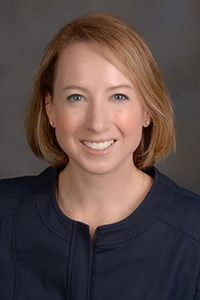
Pavlina S. Kemp, MD
Residency Program Director and Director of Medical Student Education
Rodolfo N. Perez Jr, MD, and Margaret Perez Professor in Ophthalmology Education
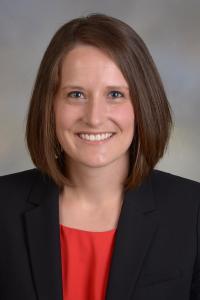
Jaclyn Haugsdal, MD
Associate Residency Program Director

Laura L. Pitlick
Residency Coordinator
Contact Us
Residency Program Coordinator

Laura Pitlick, Resident Program Coordinator
Department of Ophthalmology and Visual Sciences
University of Iowa Health Care Medical Center
200 Hawkins Drive, Iowa City, Iowa 52242-1091
1-319-353-8585
e-mail: laura-pitlick@uiowa.edu
Residency Program Director
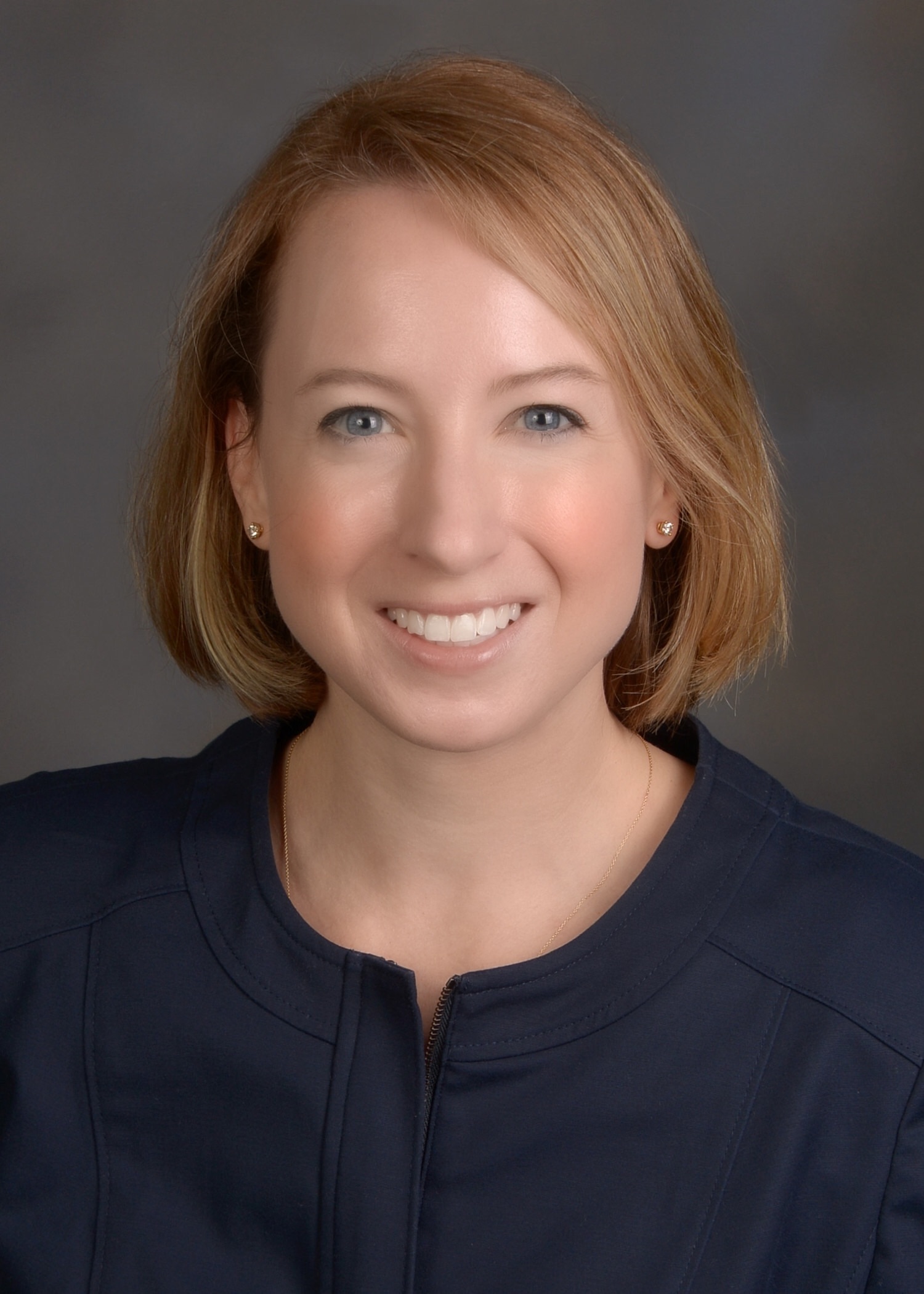
Pavlina S. Kemp, MD, Residency Program Director
Department of Ophthalmology and Visual Sciences
University of Iowa Health Care Medical Center
200 Hawkins Drive, Iowa City, Iowa 52242-1091
1-319-356-2864
e-mail: pavlina-kemp@uiowa.edu
Associate Residency Program Director

Jacyln M. Haugsdal, MD, Associate Residency Program Director
Department of Ophthalmology and Visual Sciences
University of Iowa Health Care Medical Center
200 Hawkins Drive, Iowa City, Iowa 52242-1091
1-319-356-8118
e-mail: jaclyn-haugsdal@uiowa.edu
Department Chair
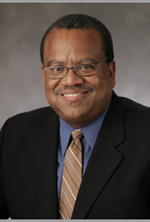
Keith D. Carter, MD, Chair
Lillian C. O'Brien and Dr. C.S. O'Brien Chair in Ophthalmology
Department of Ophthalmology and Visual Sciences
University of Iowa Health Care Medical Center
200 Hawkins Drive, Iowa City, Iowa 52242-1091
1-319-356-2867
e-mail: keith-carter@uiowa.edu
Medical students interested in doing an ophthalmology rotation at the University of Iowa should contact Tonya Looker: email tonya-looker@uiowa.edu or phone 1-319-356-2921.

